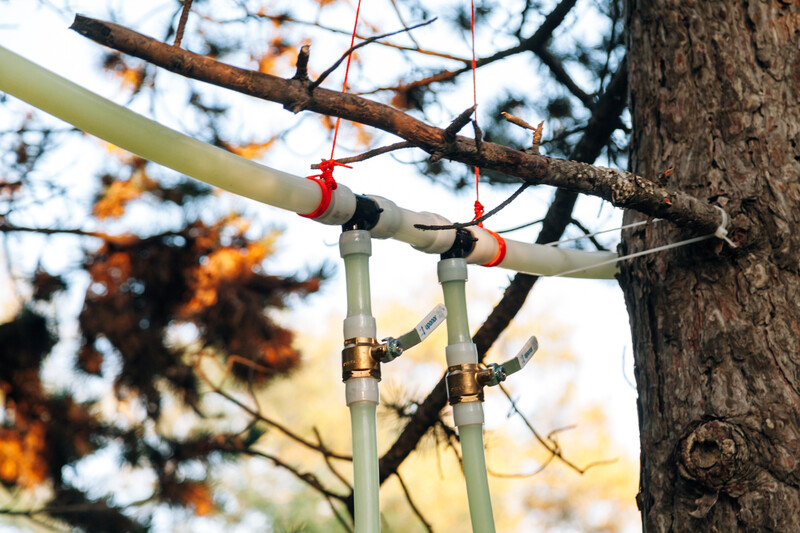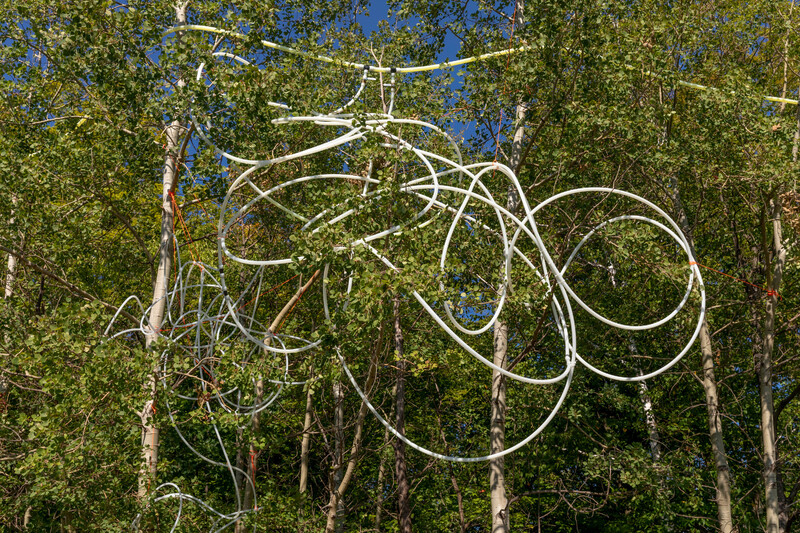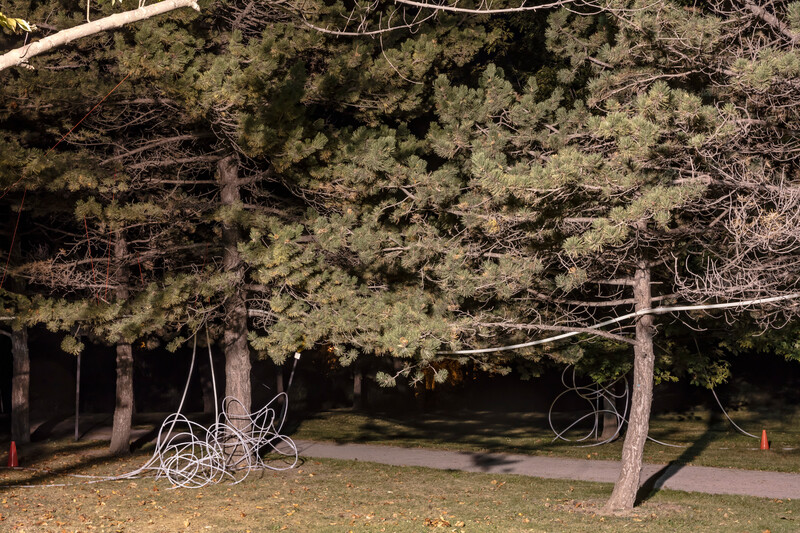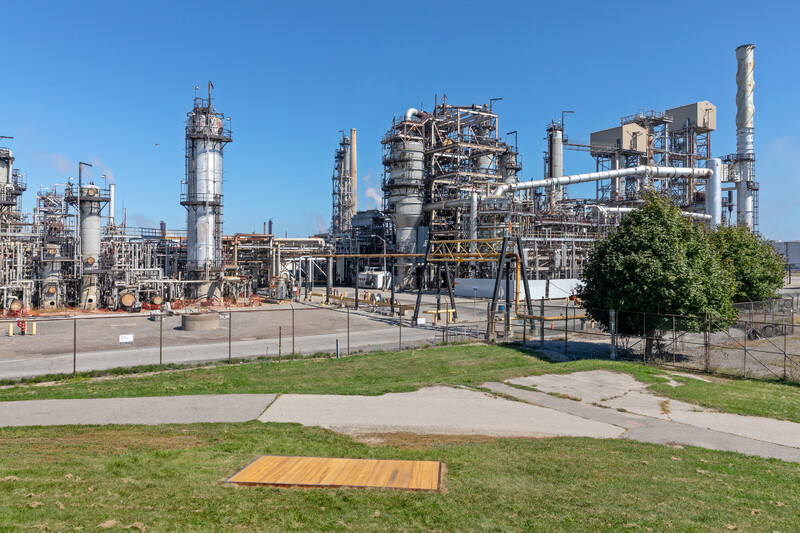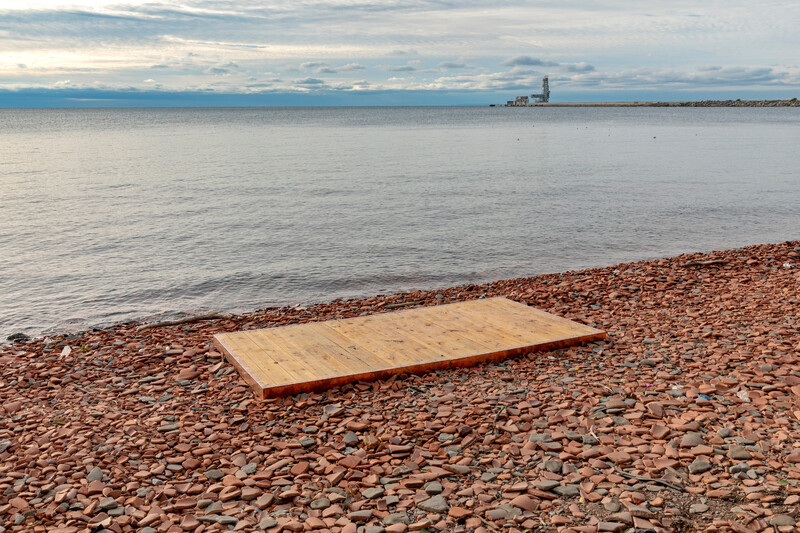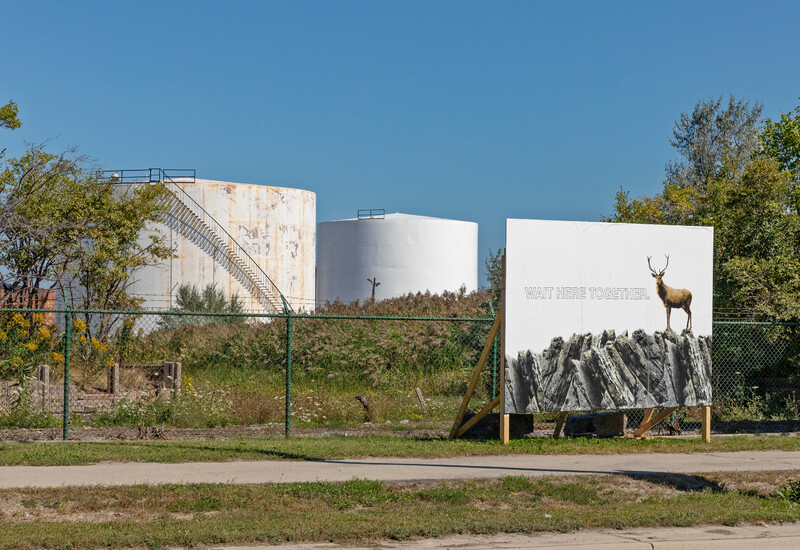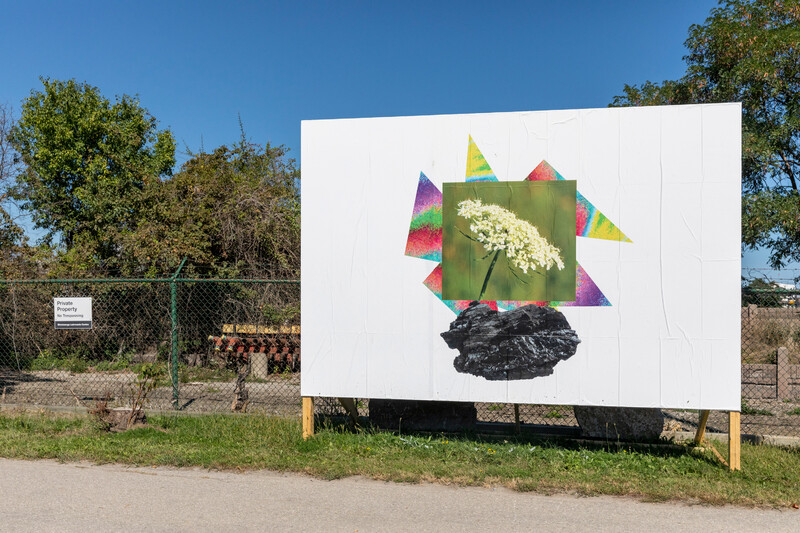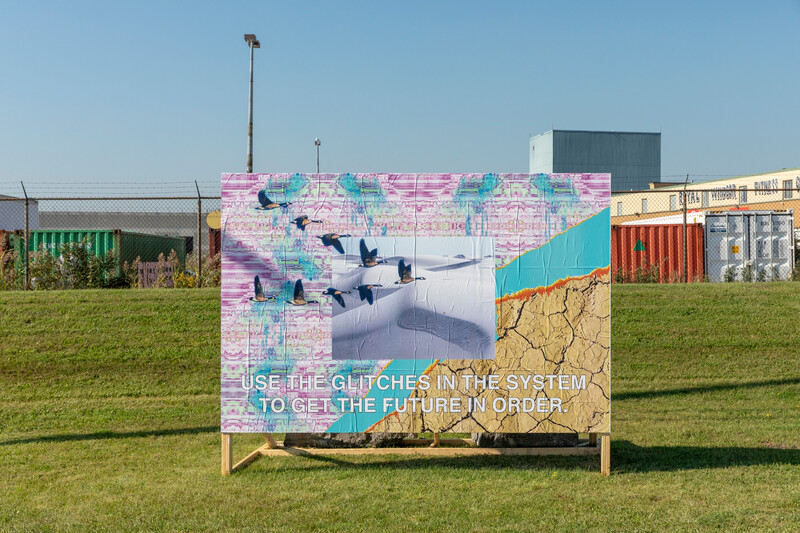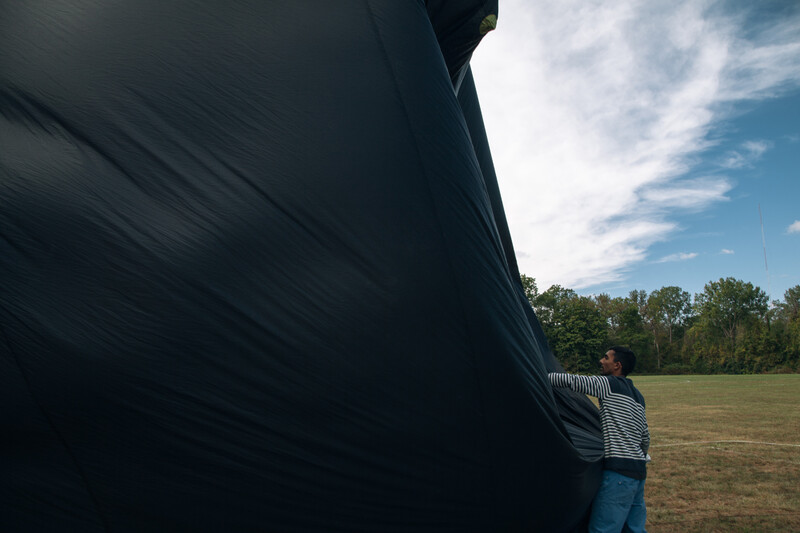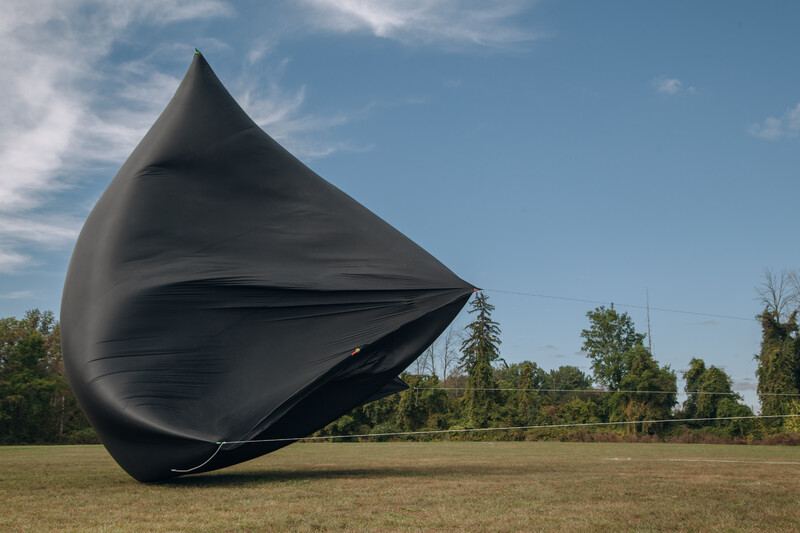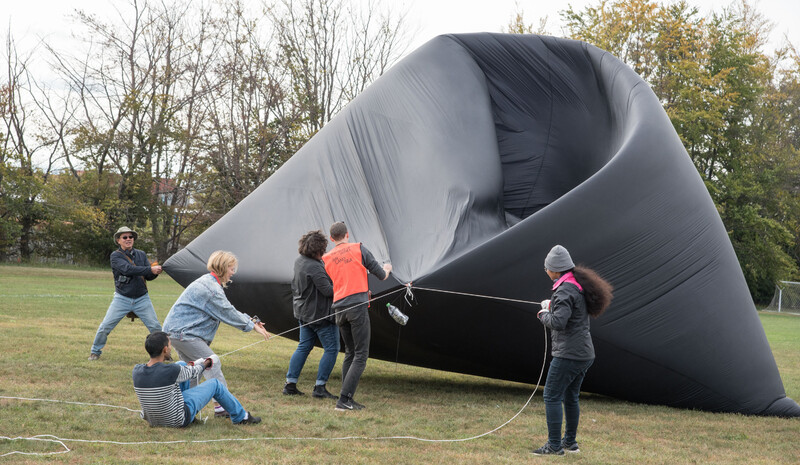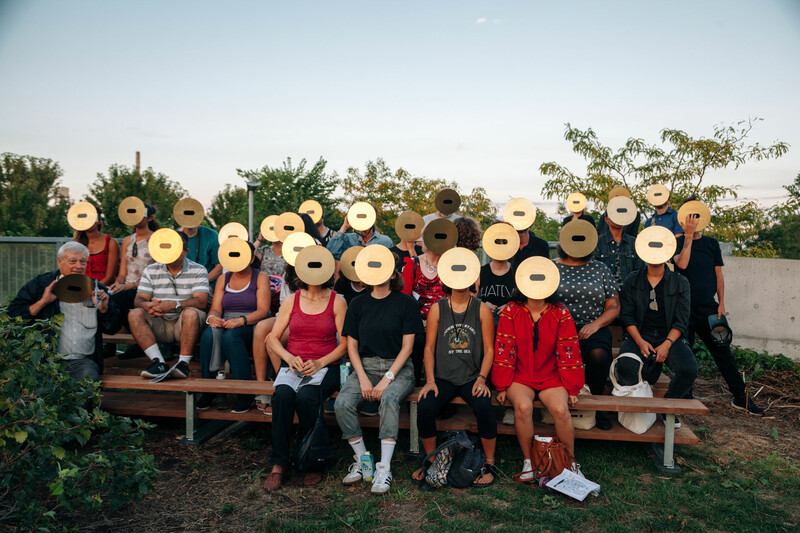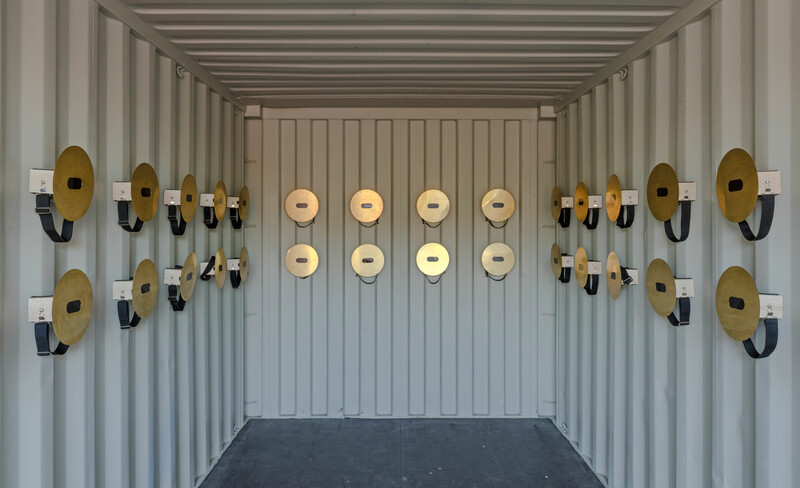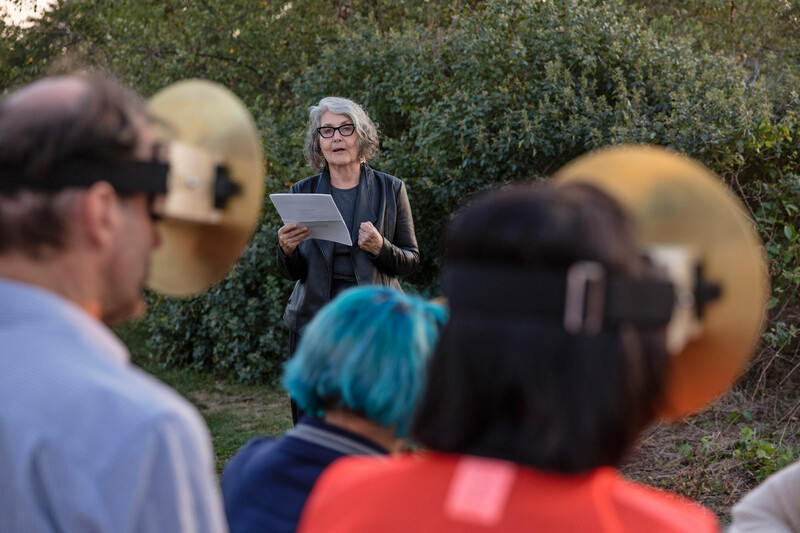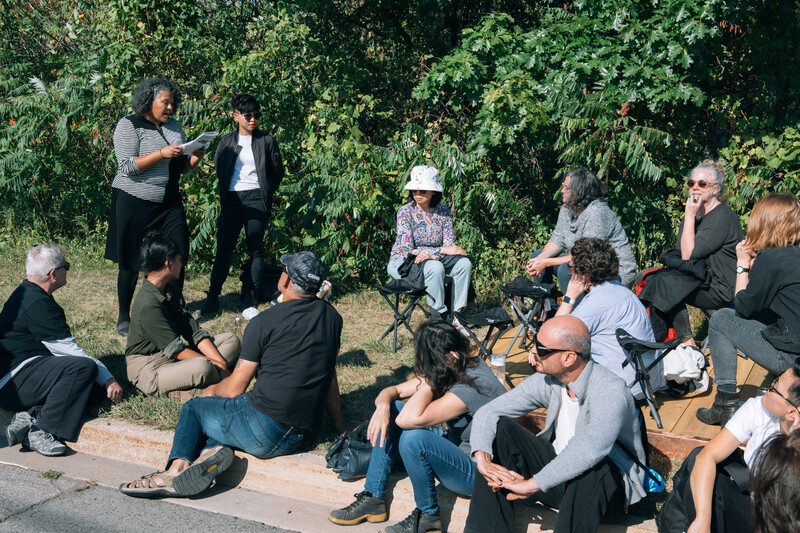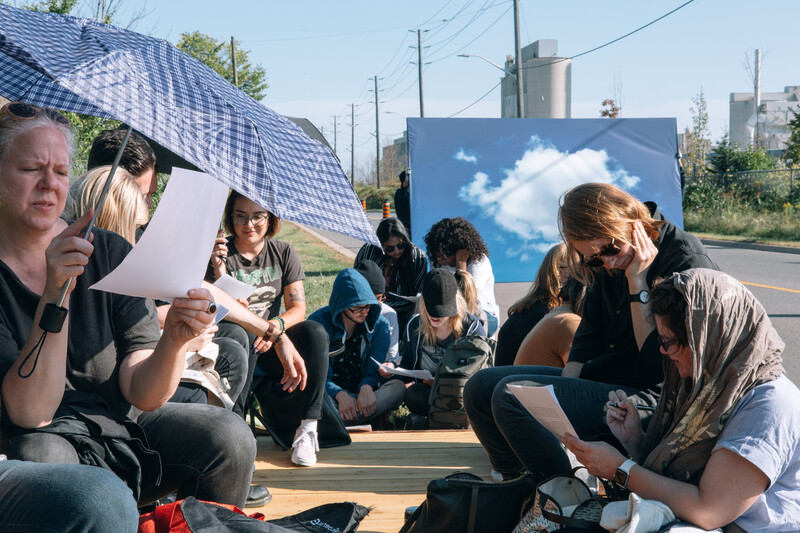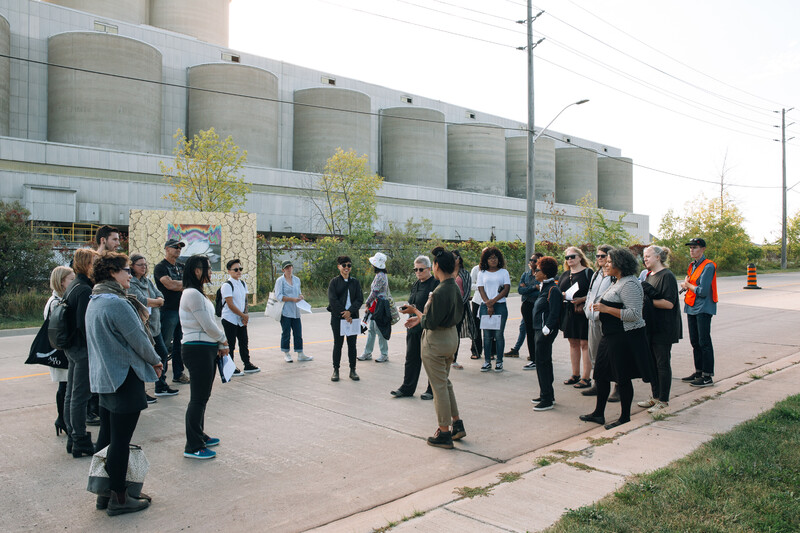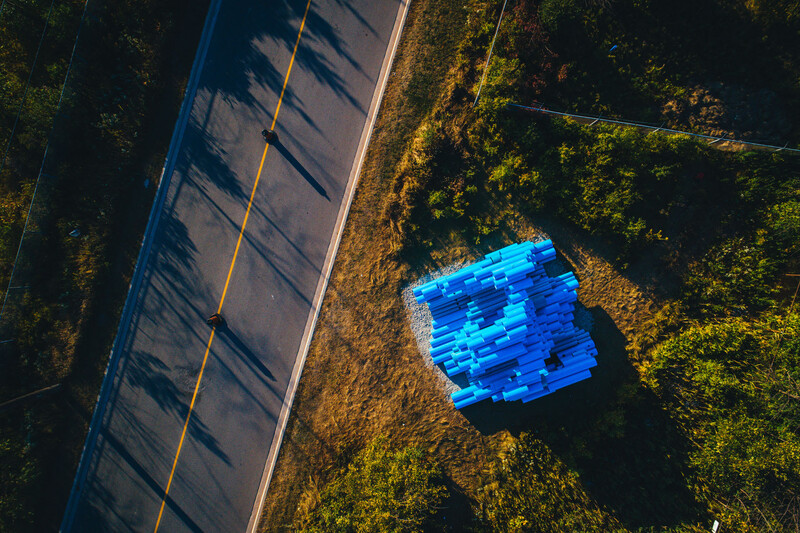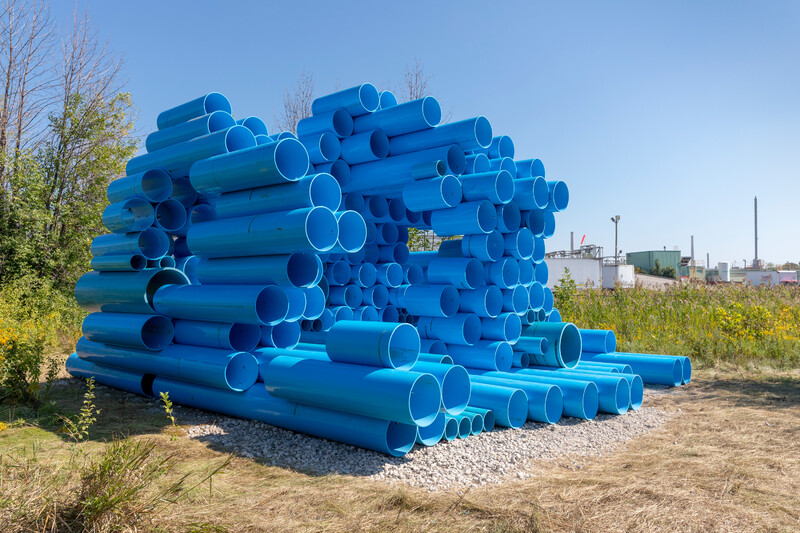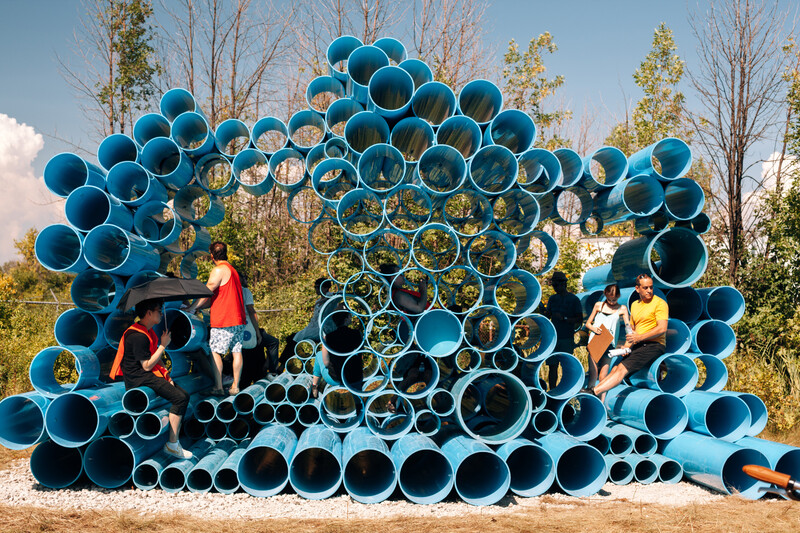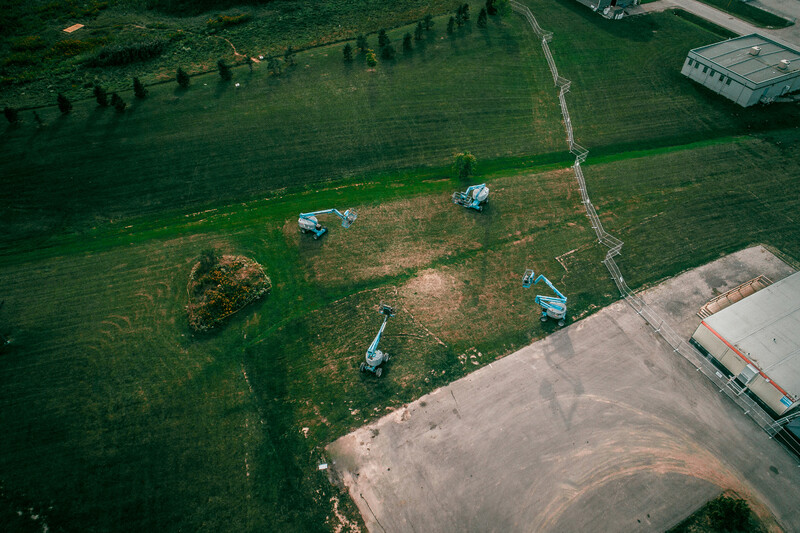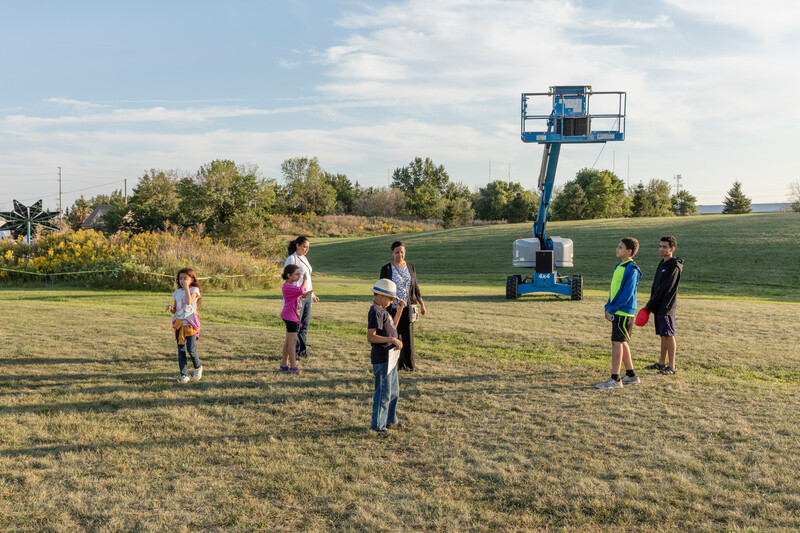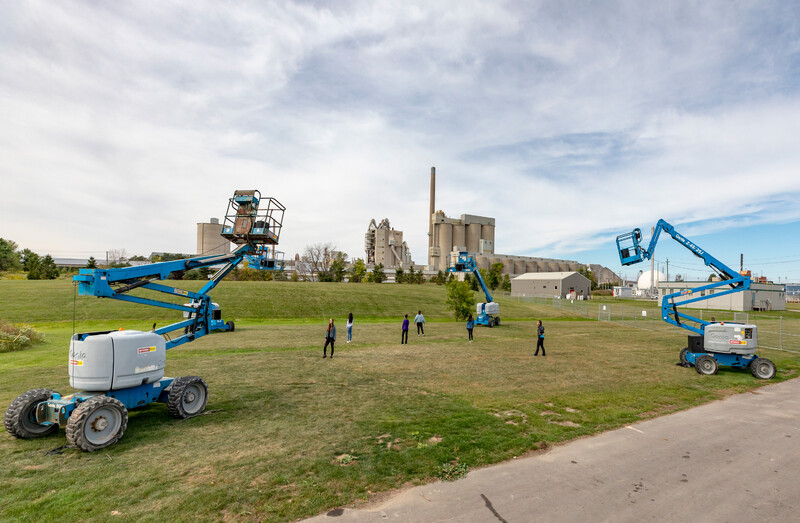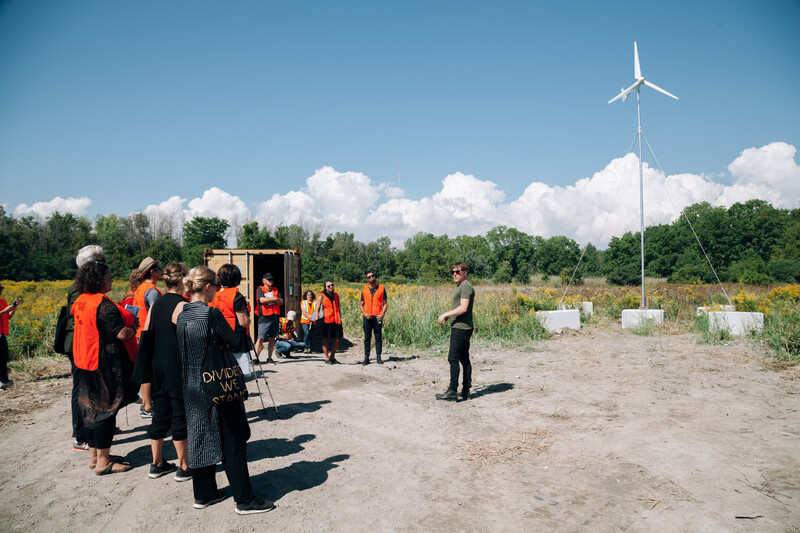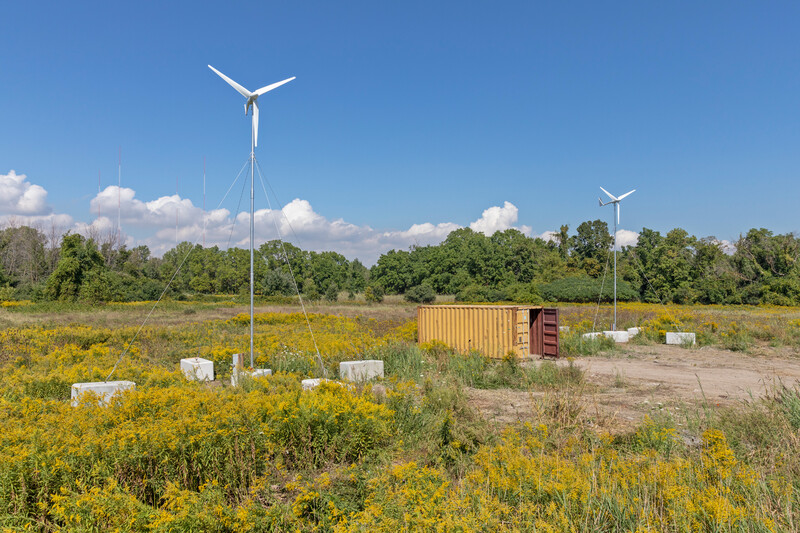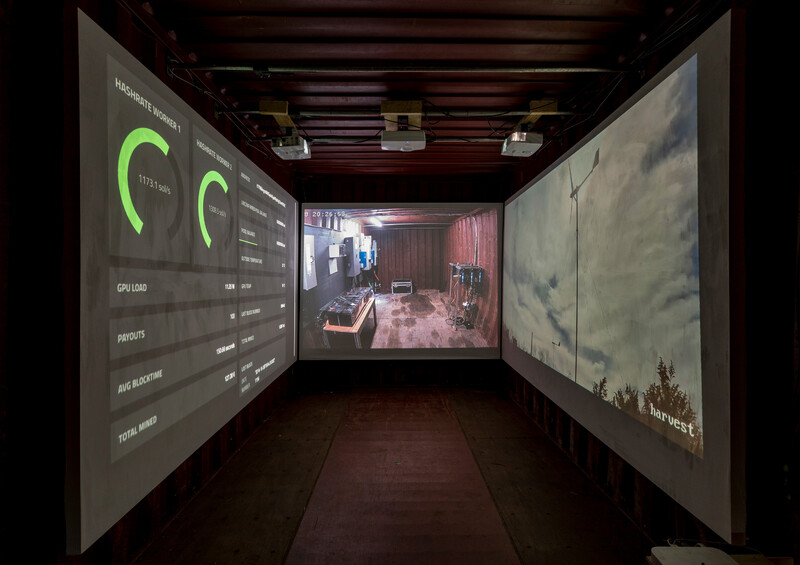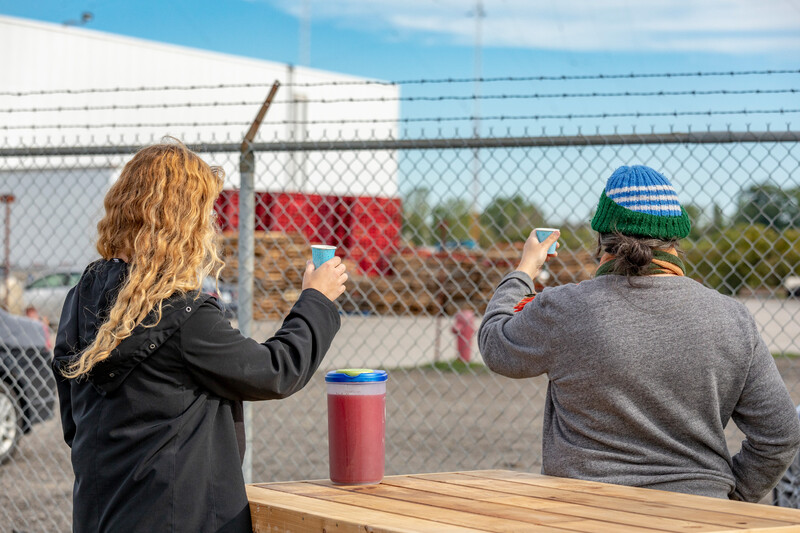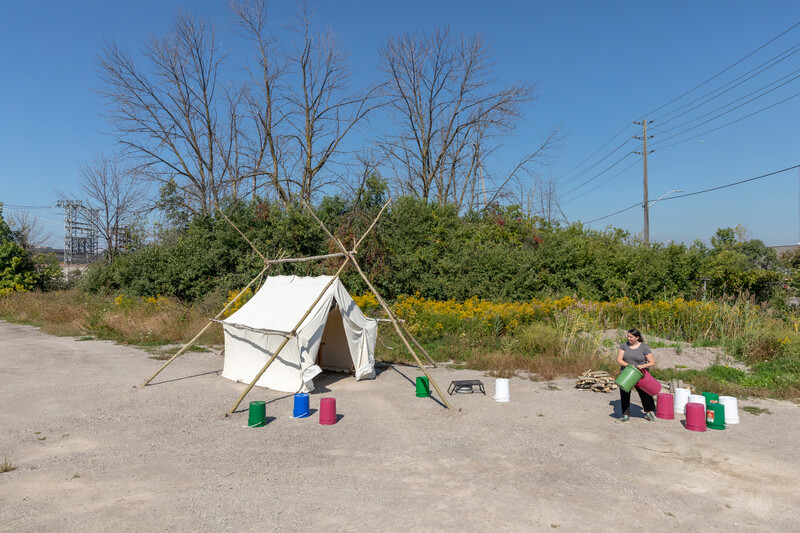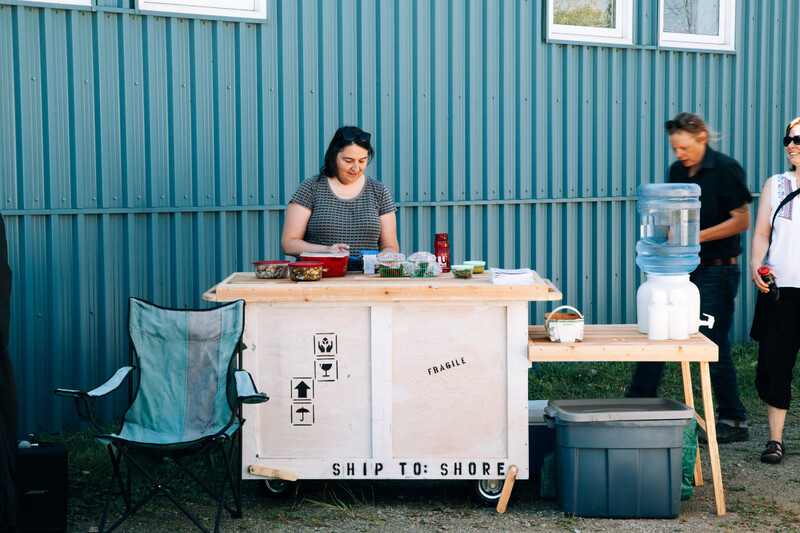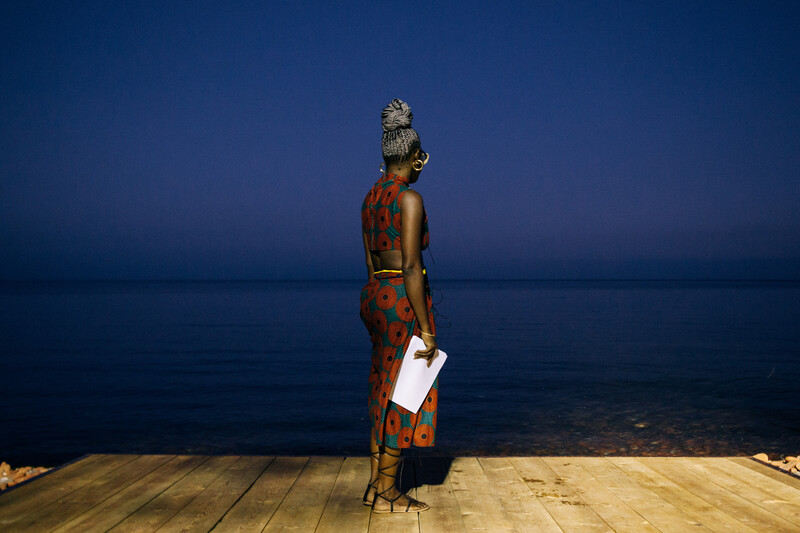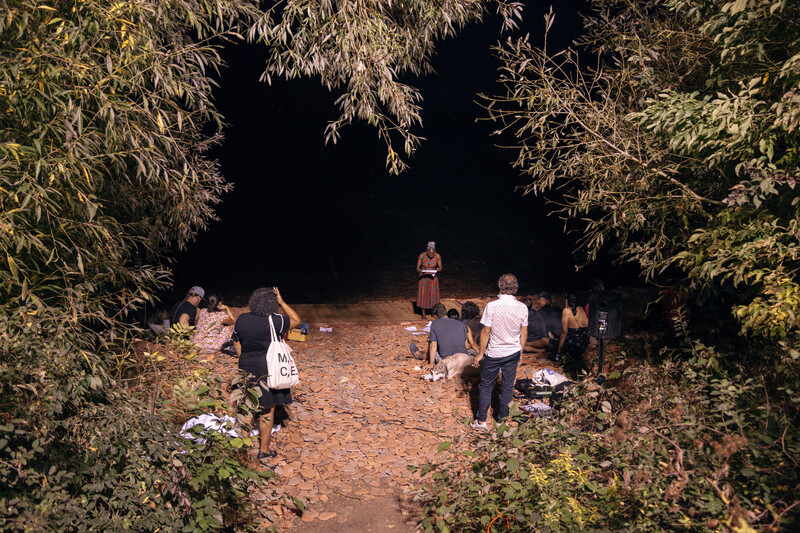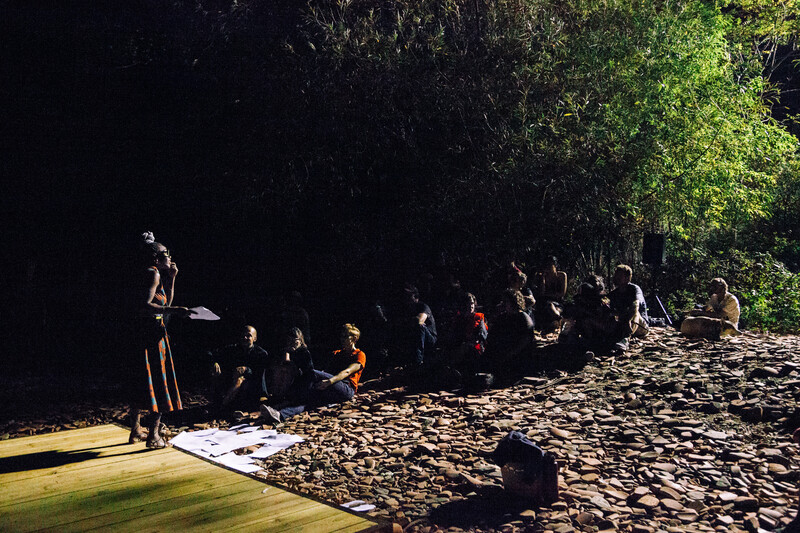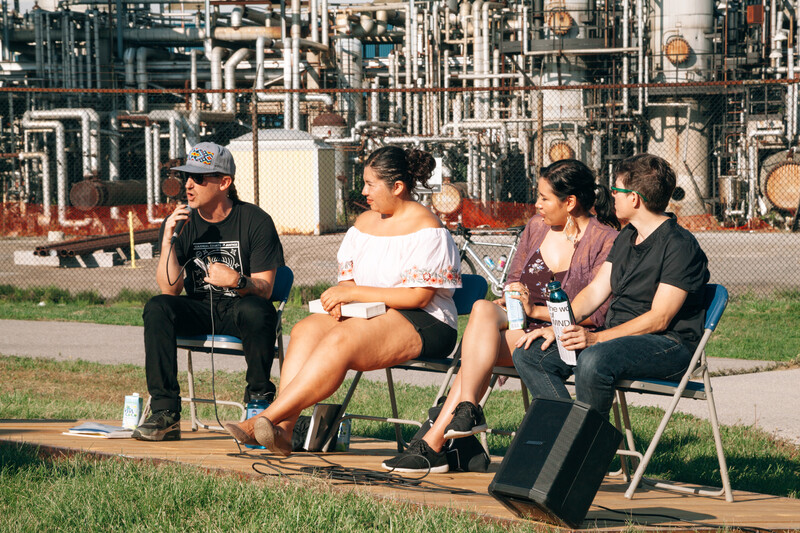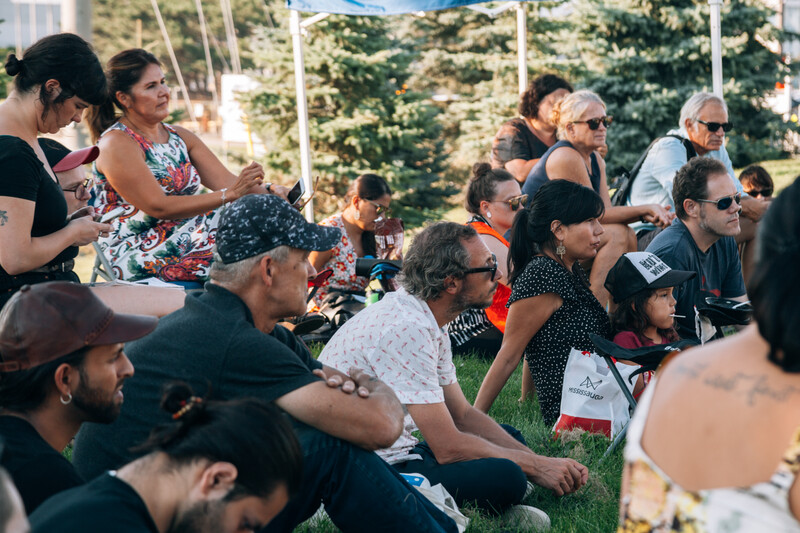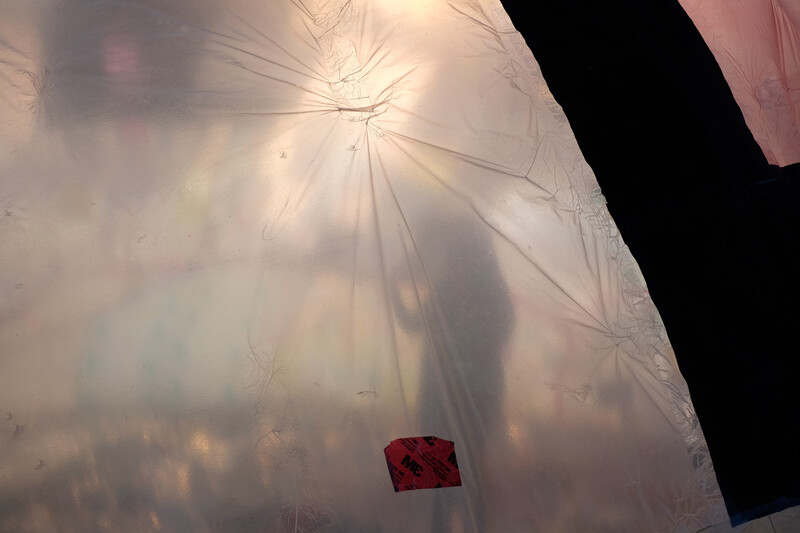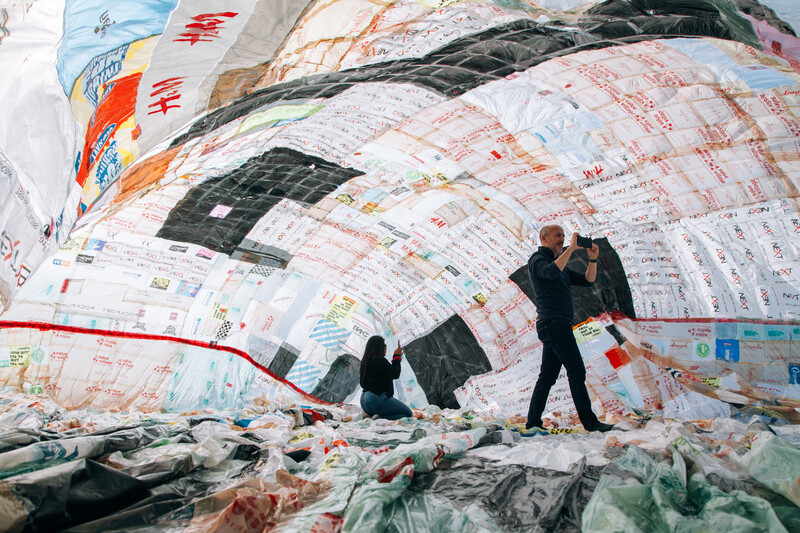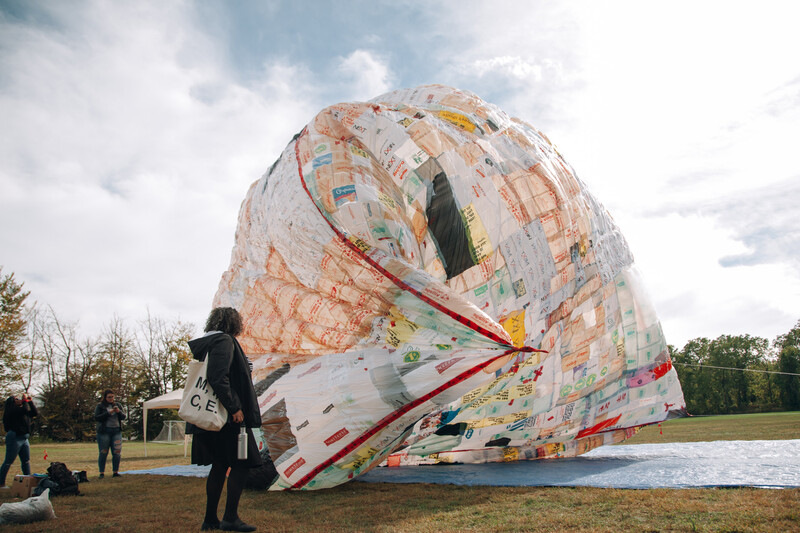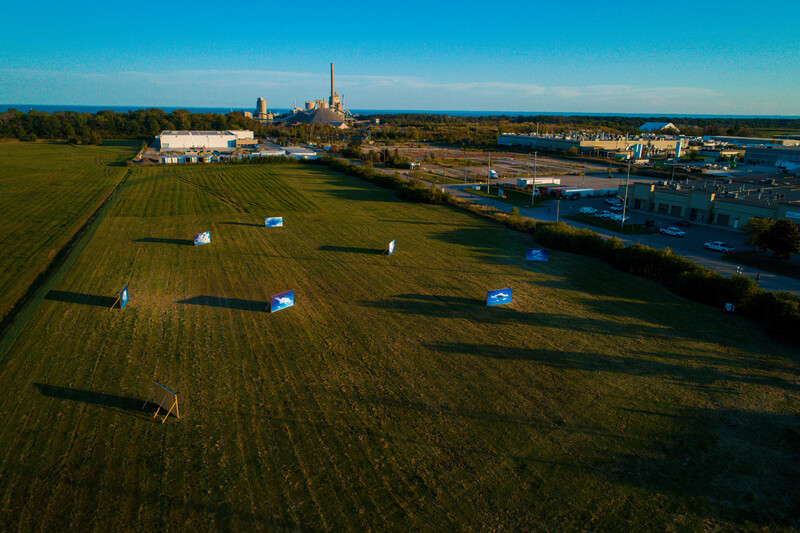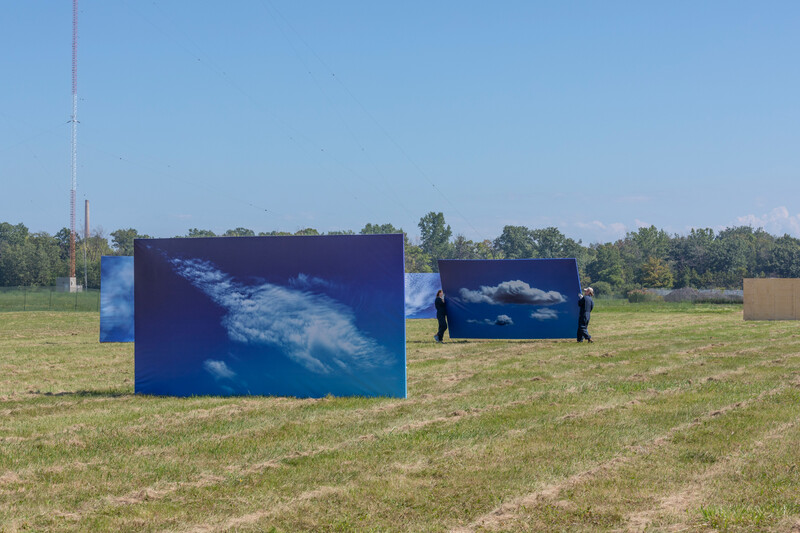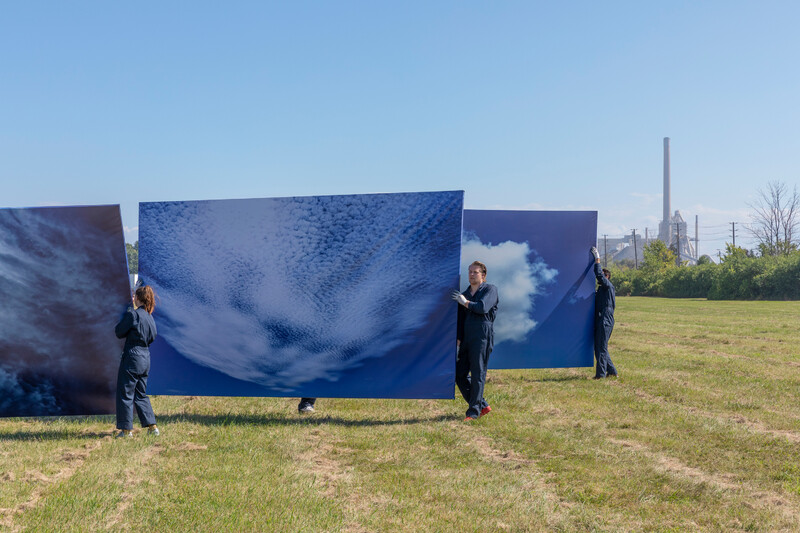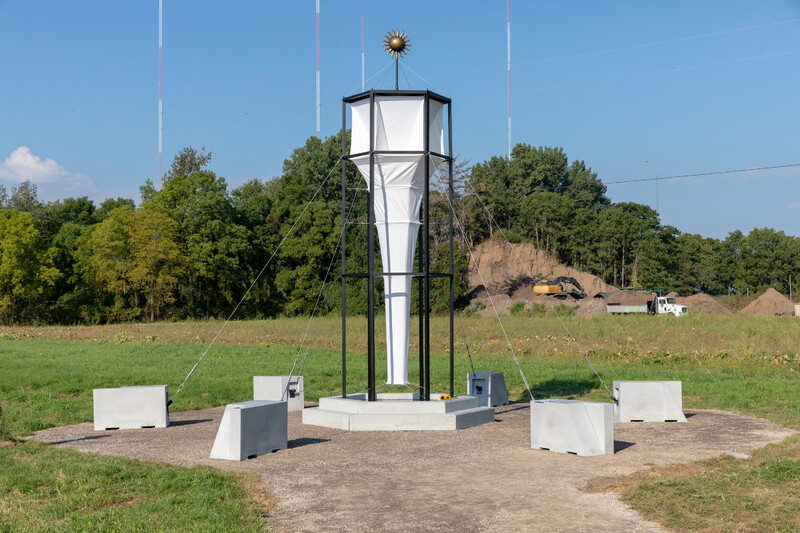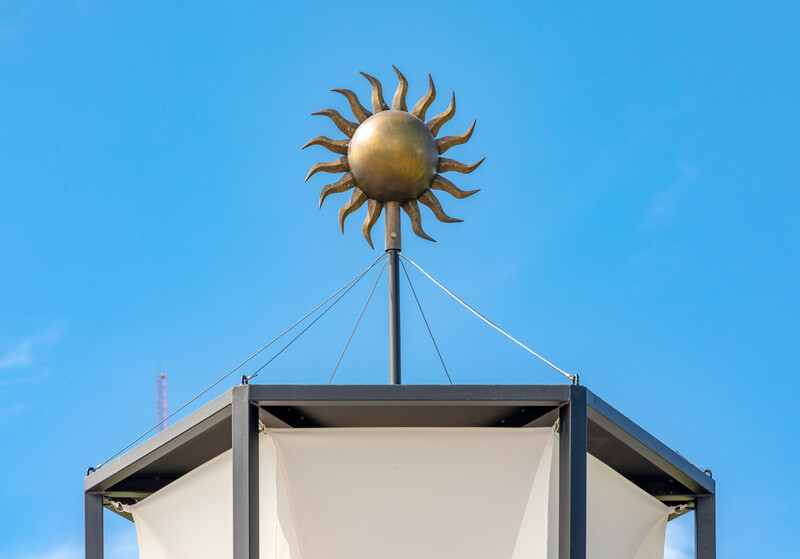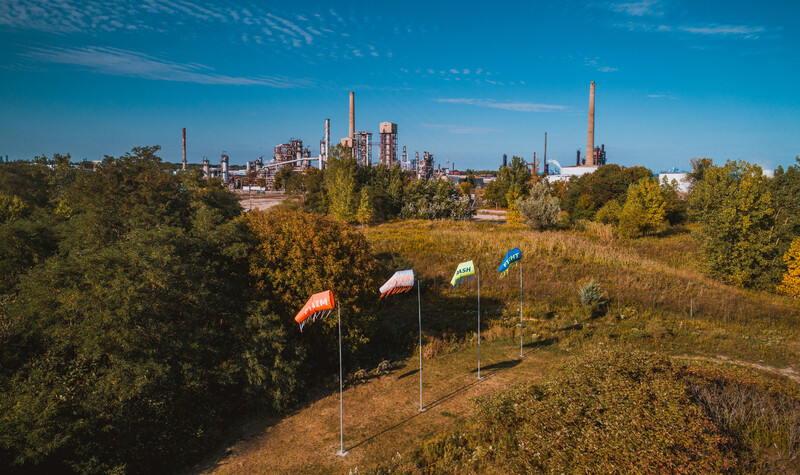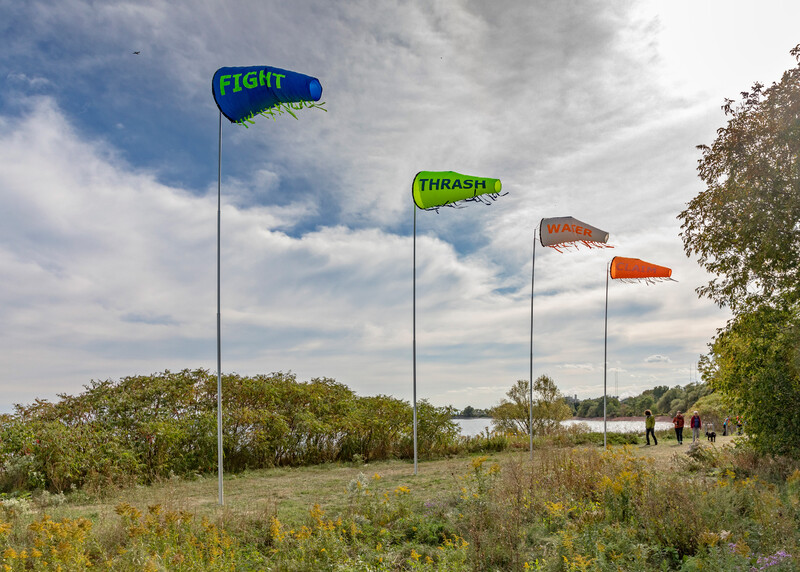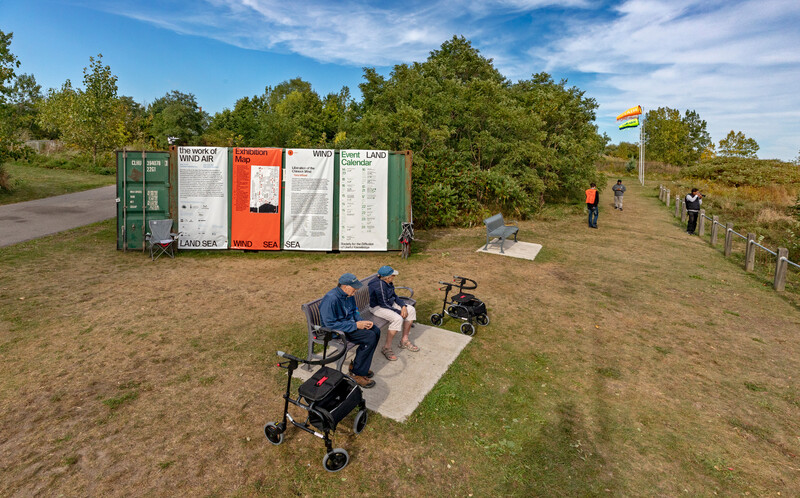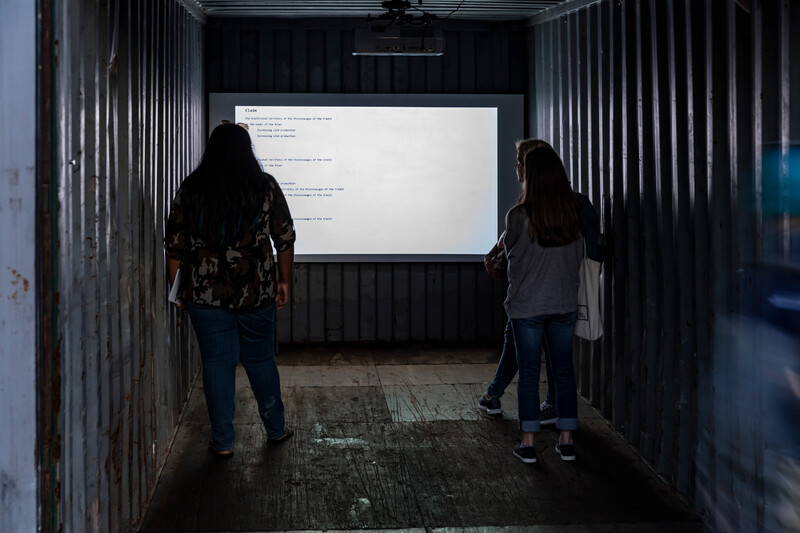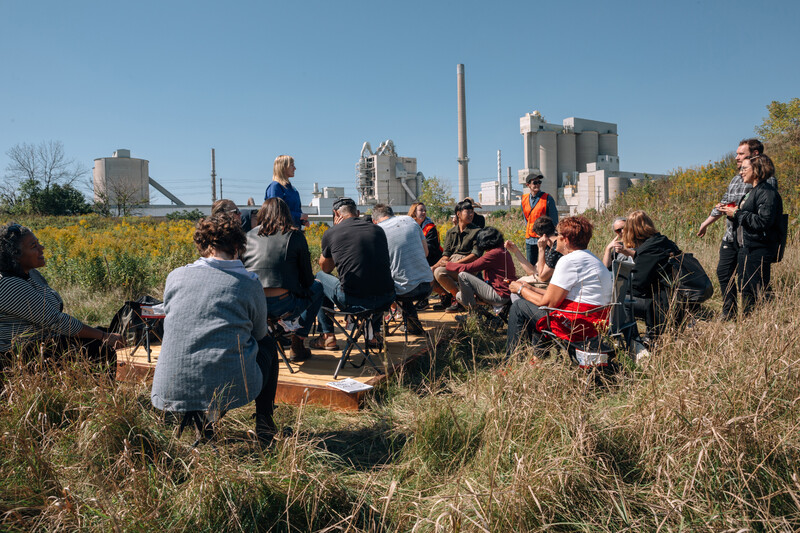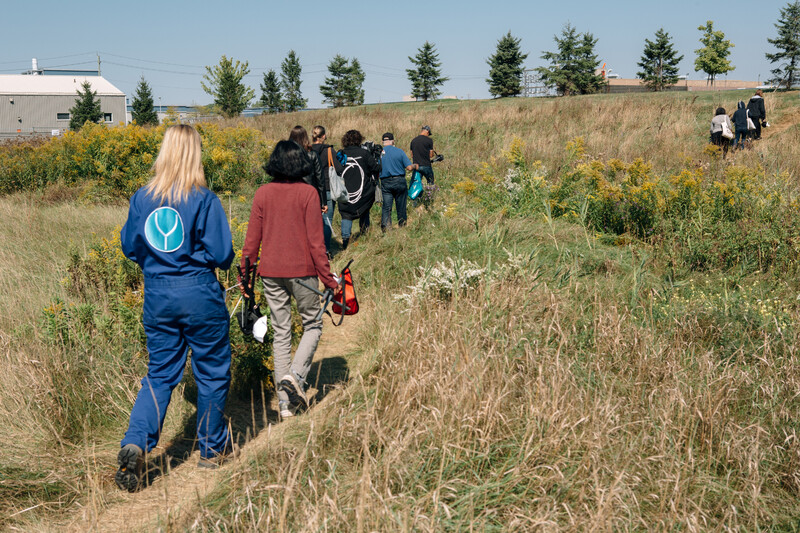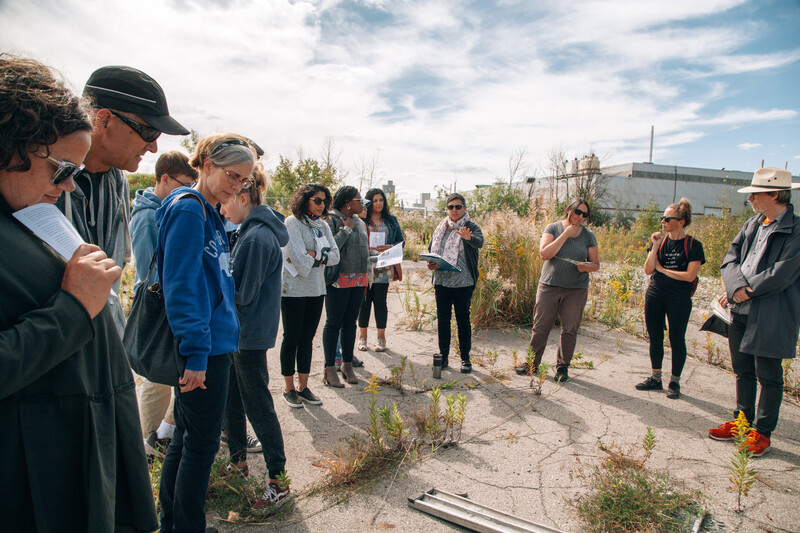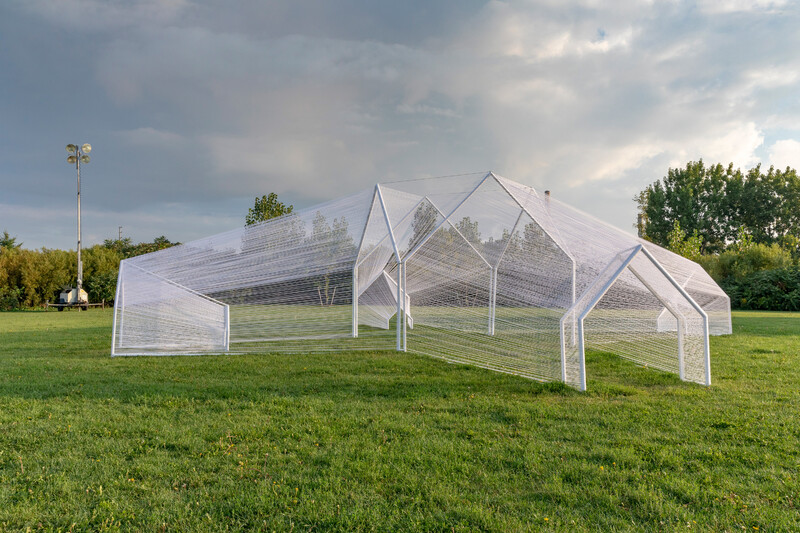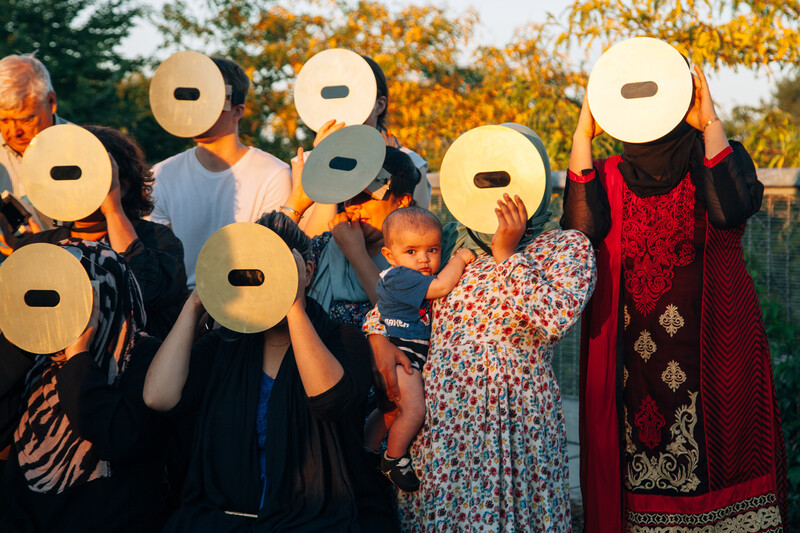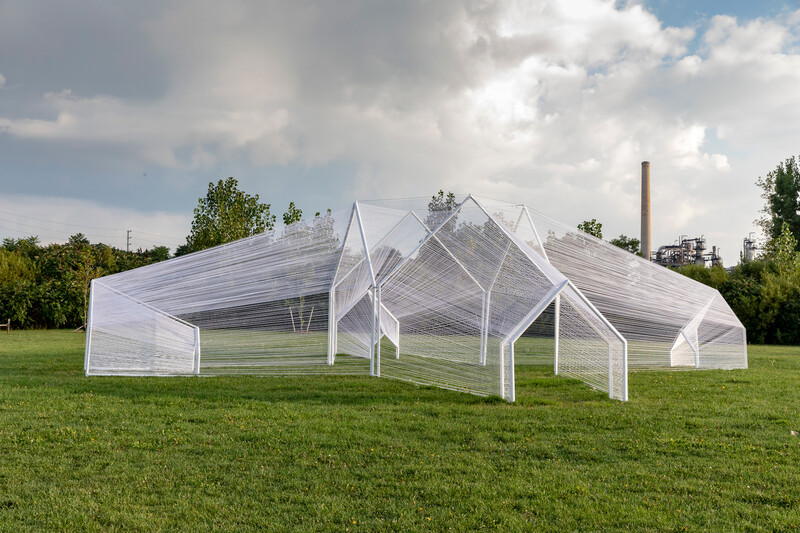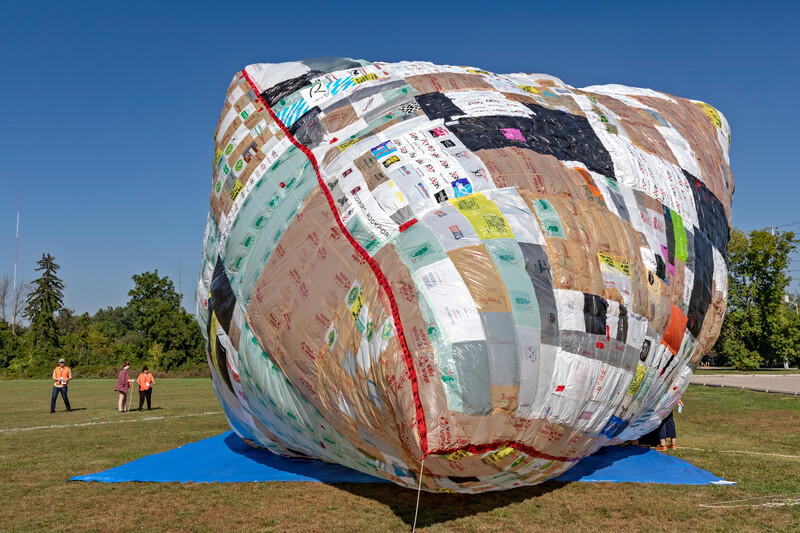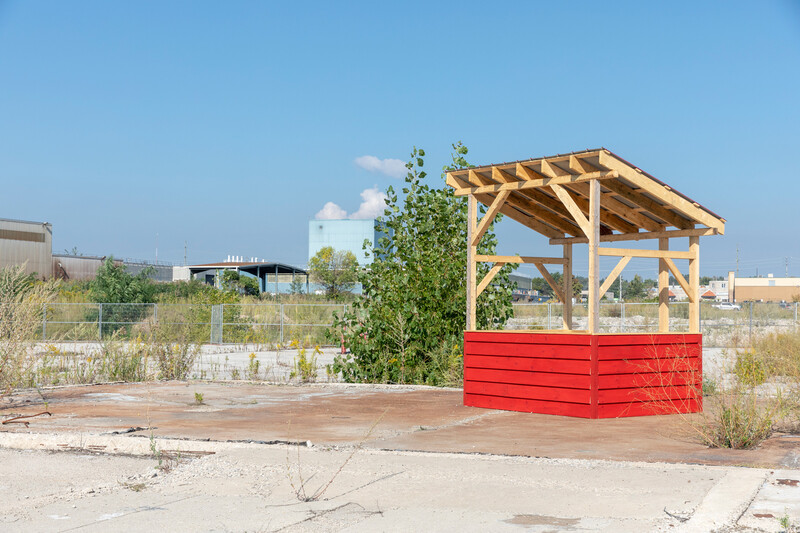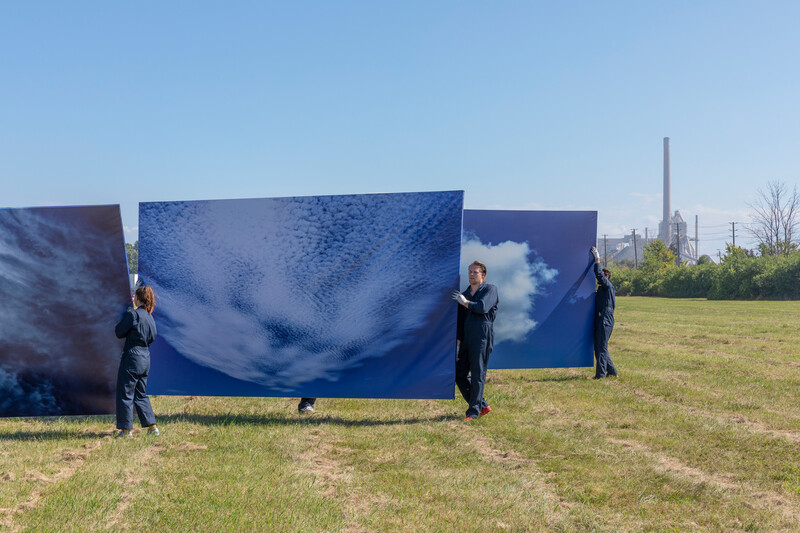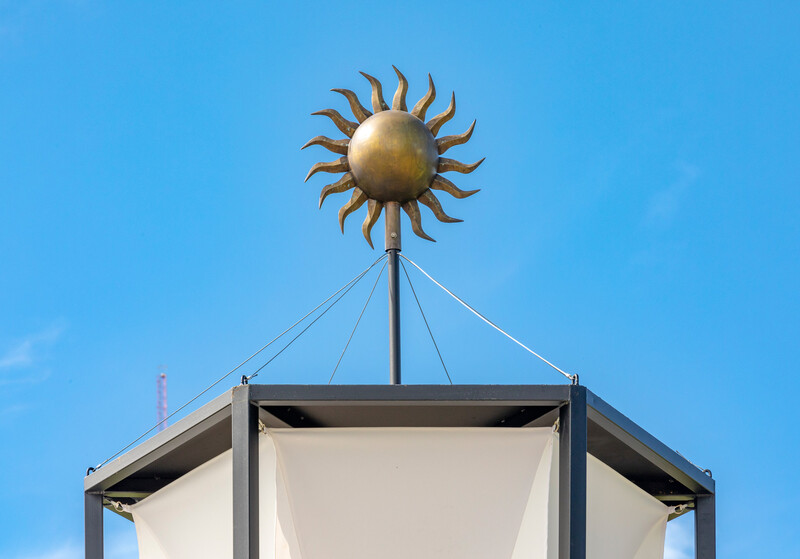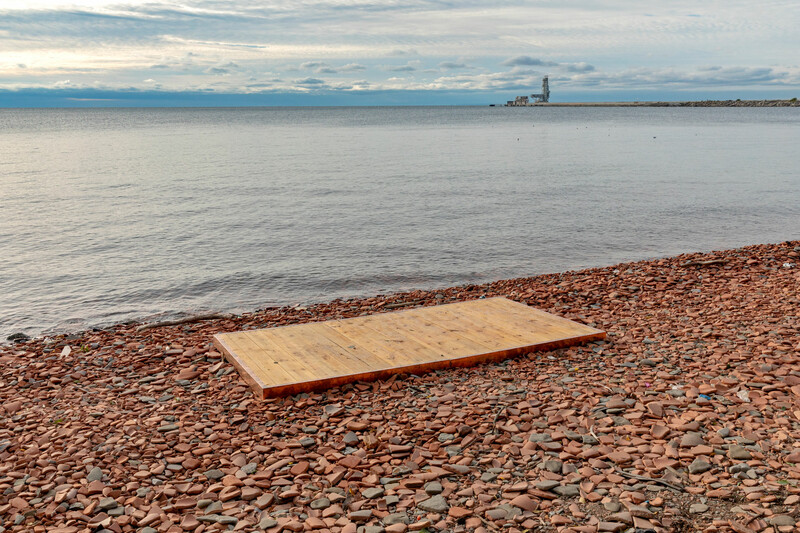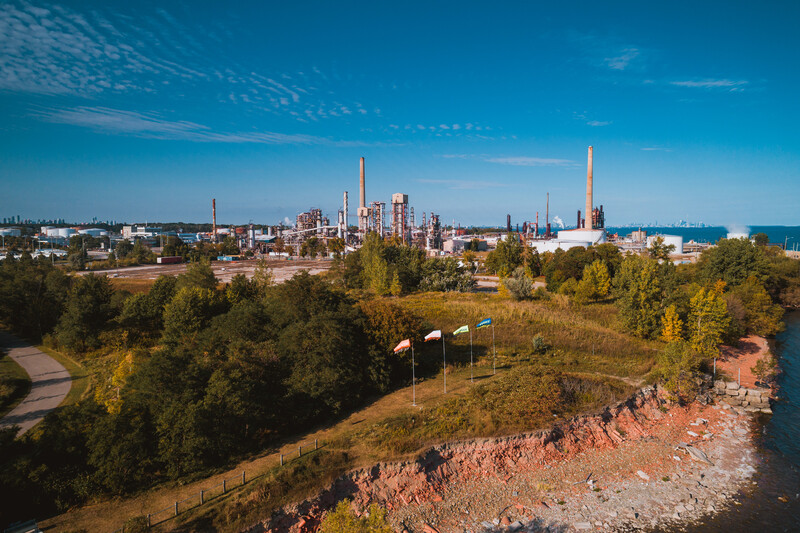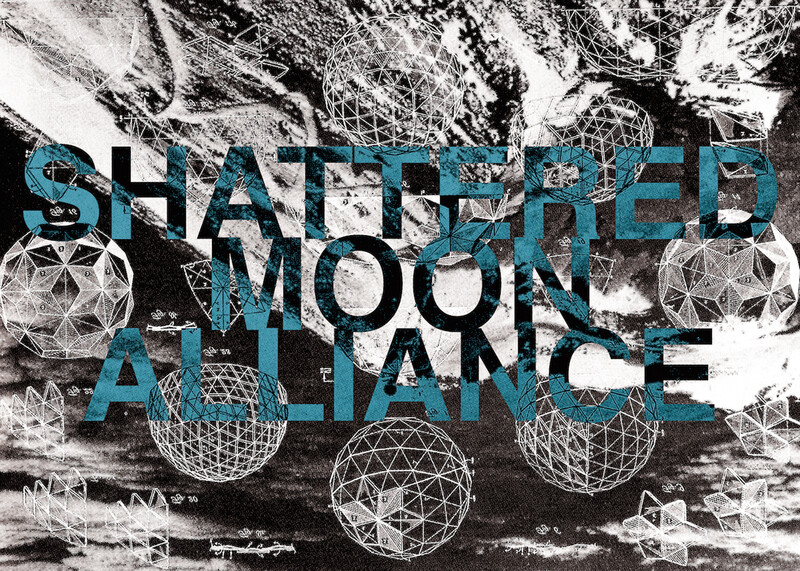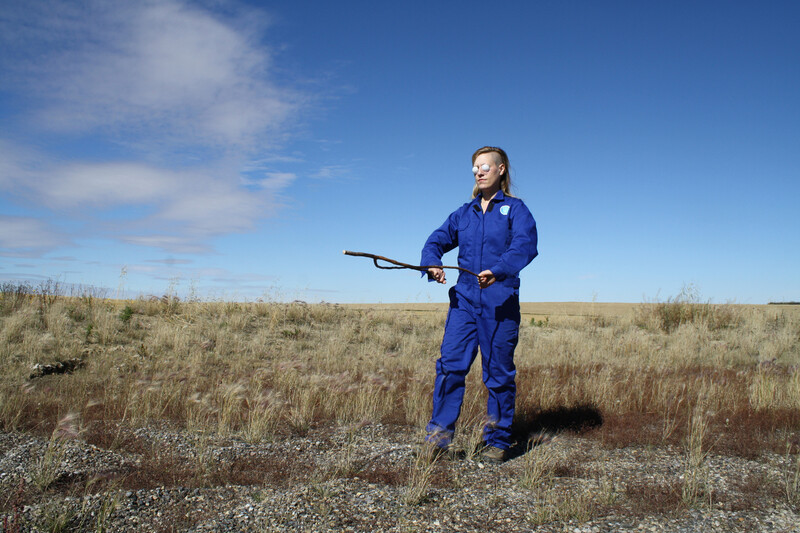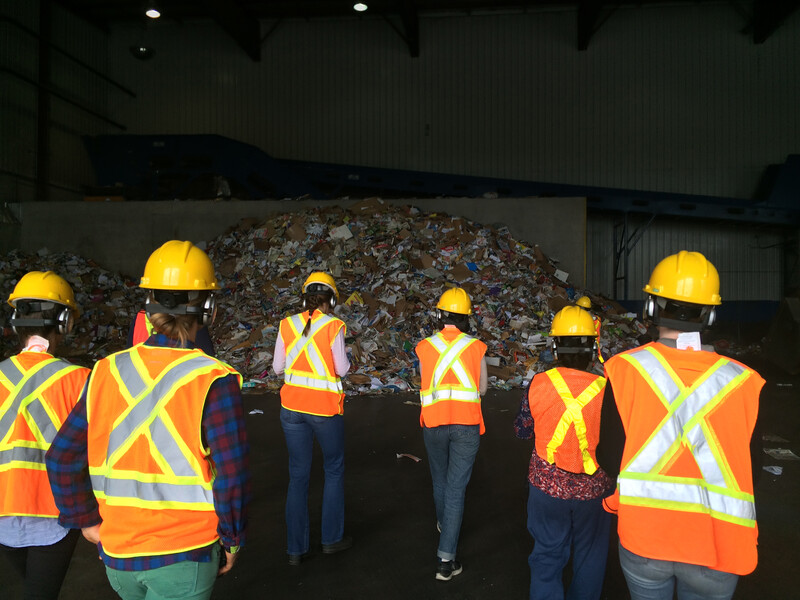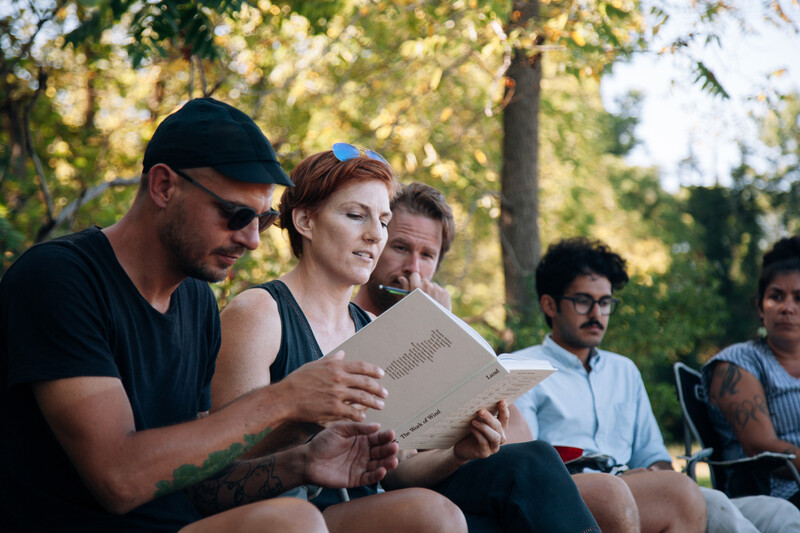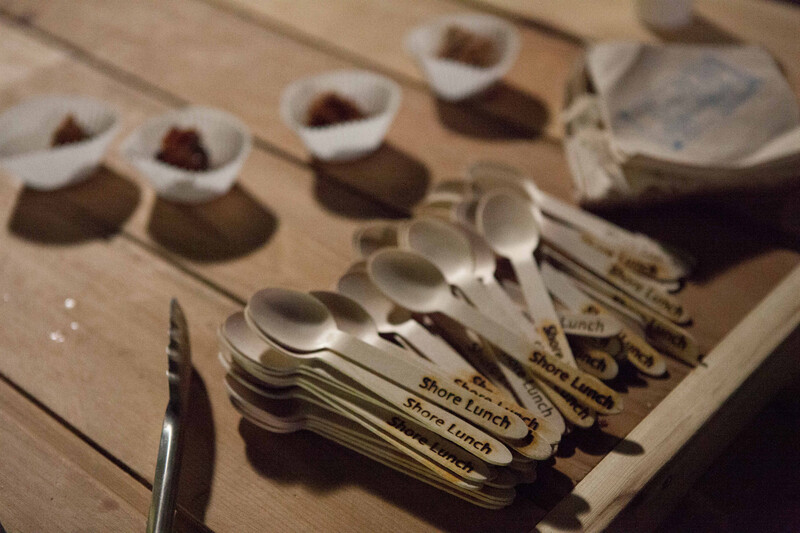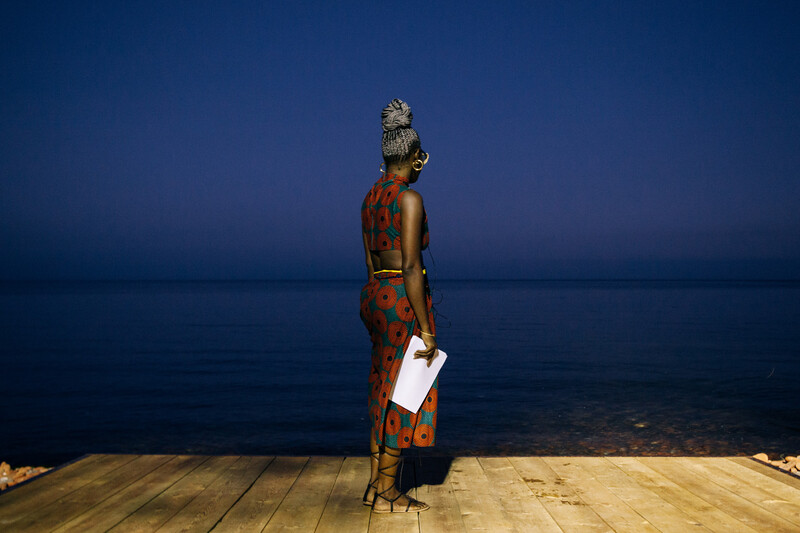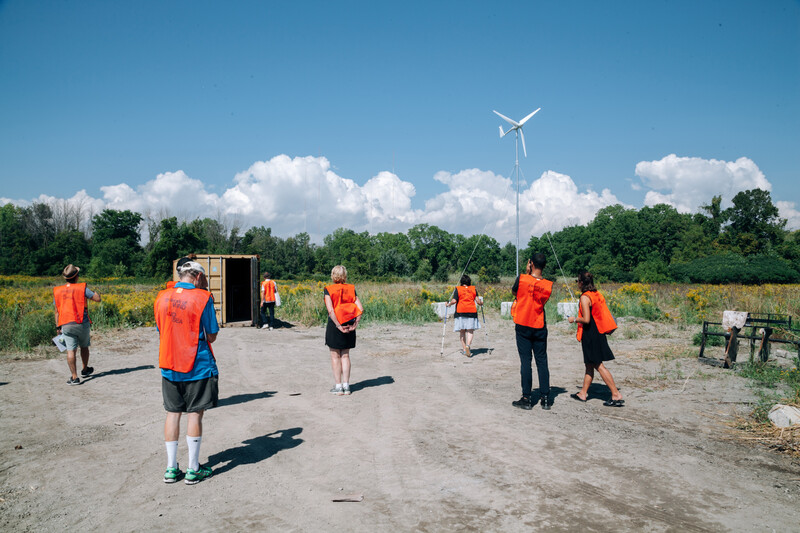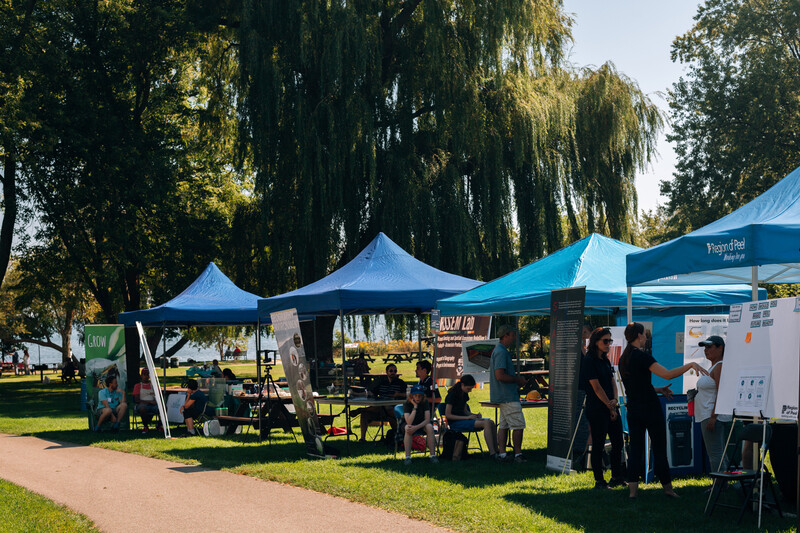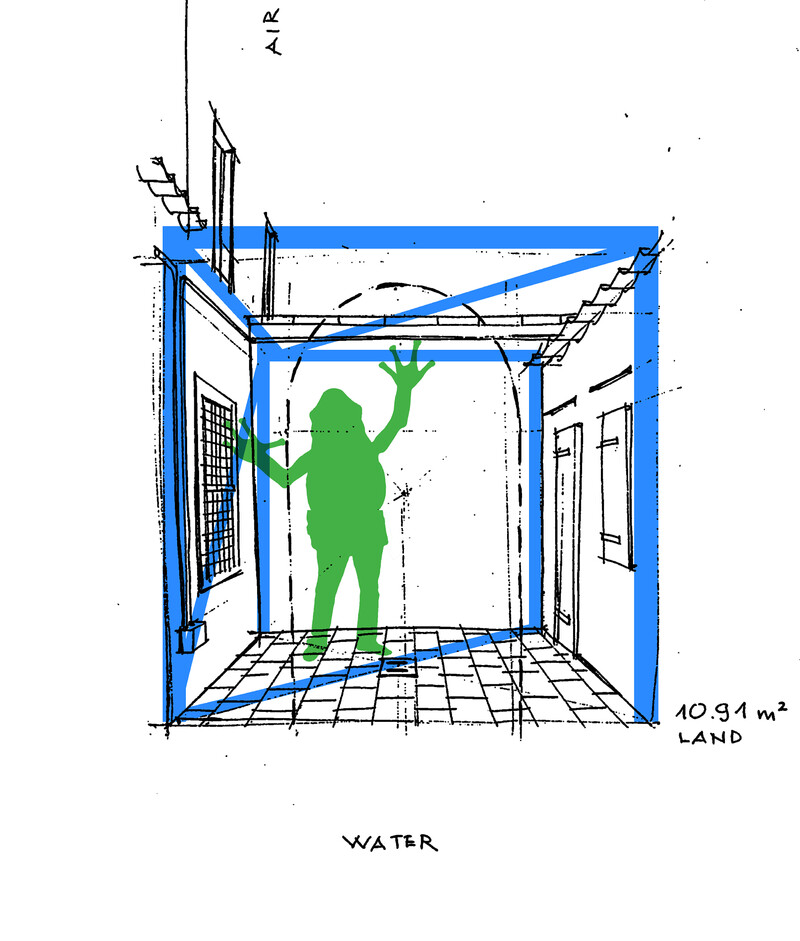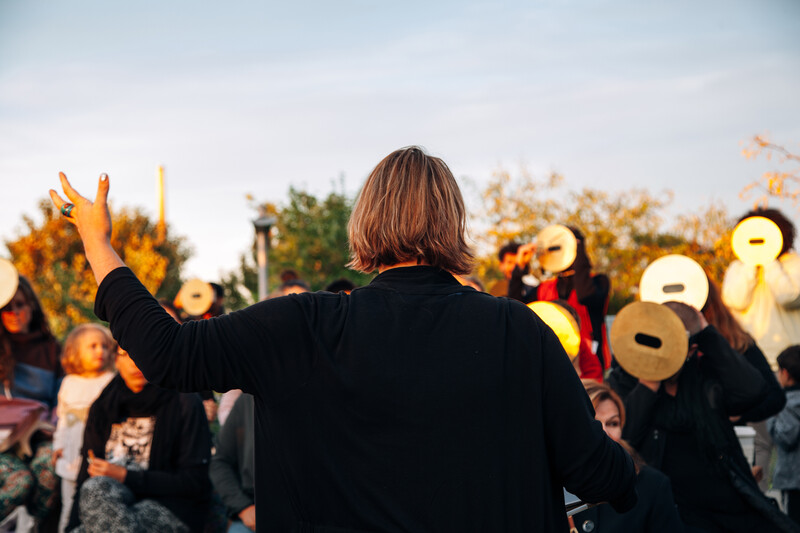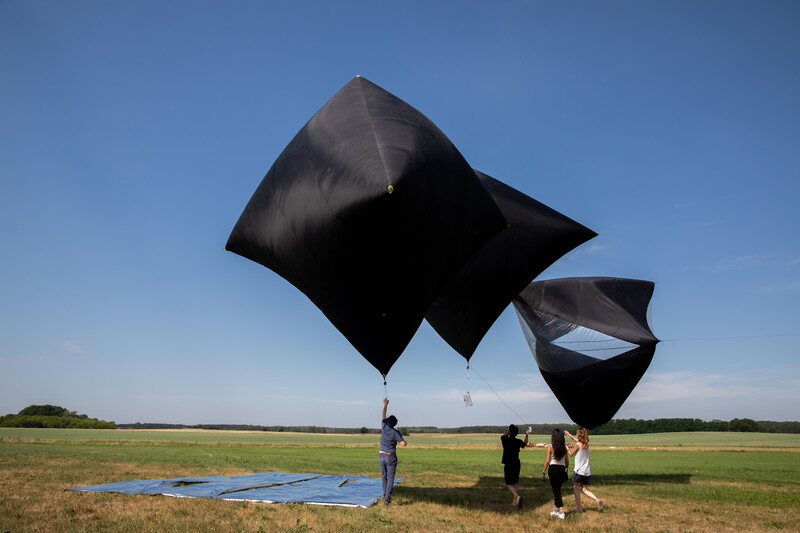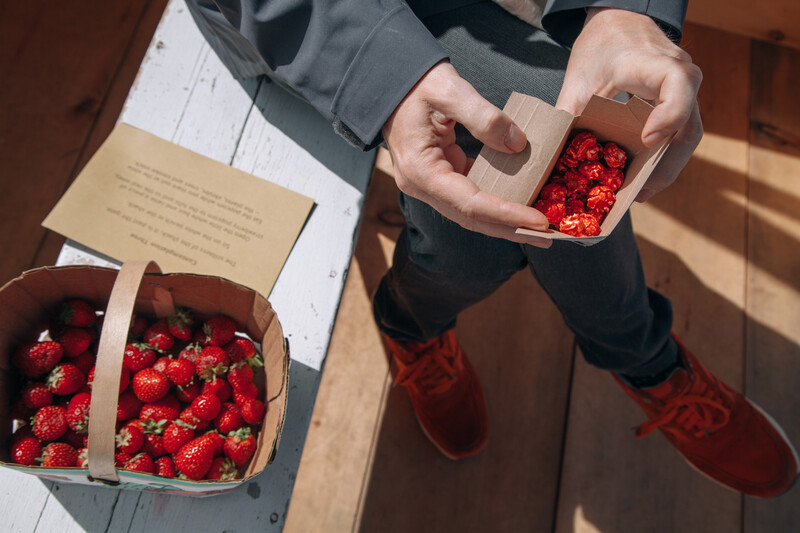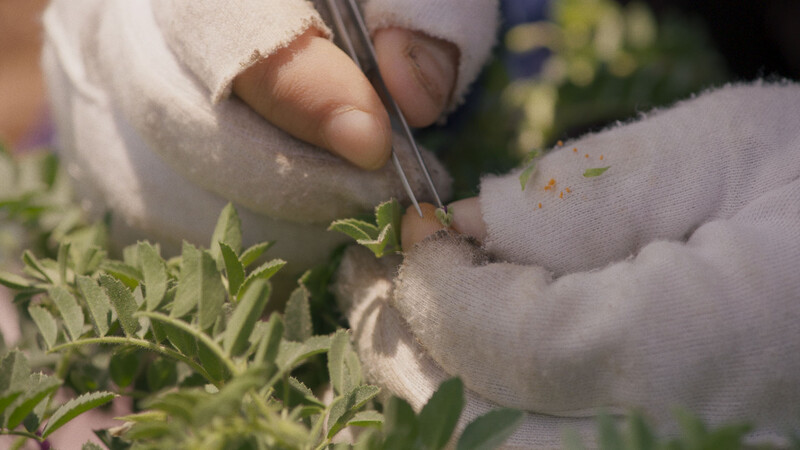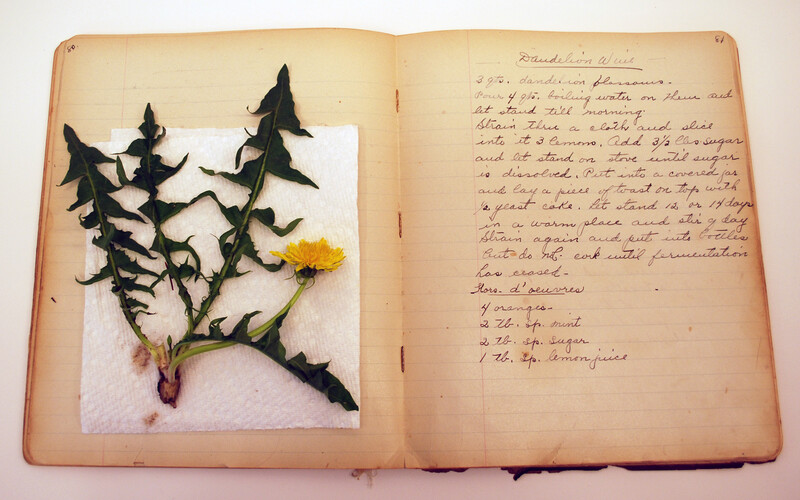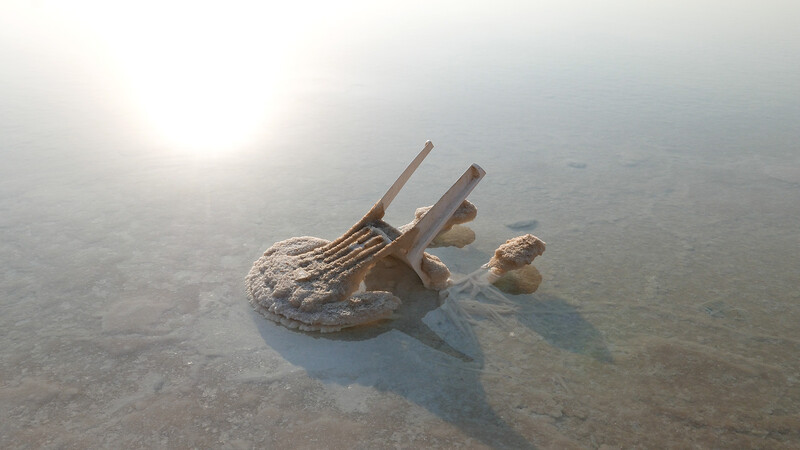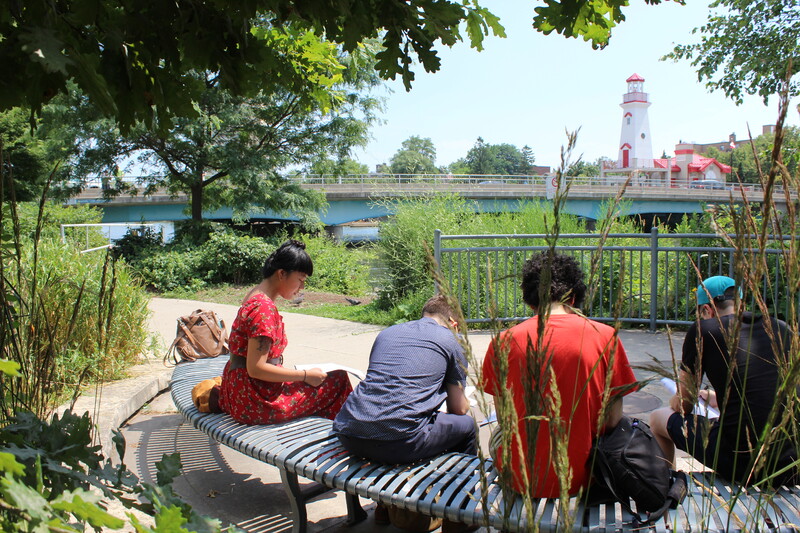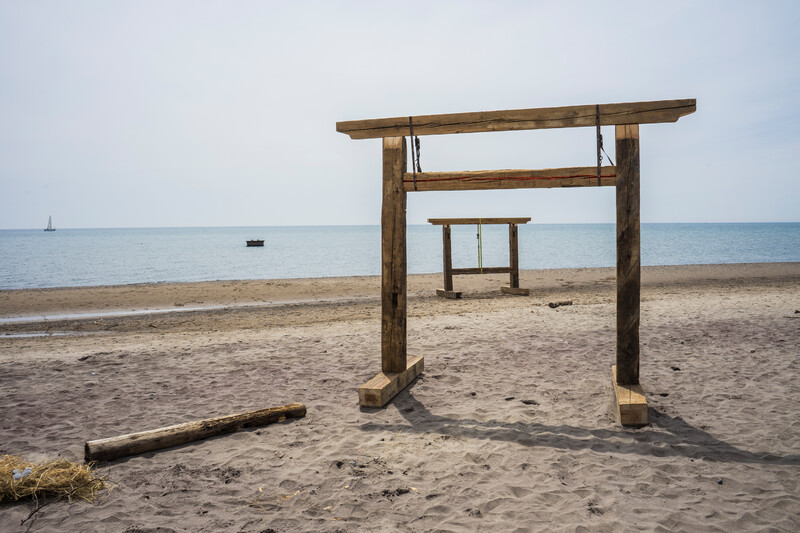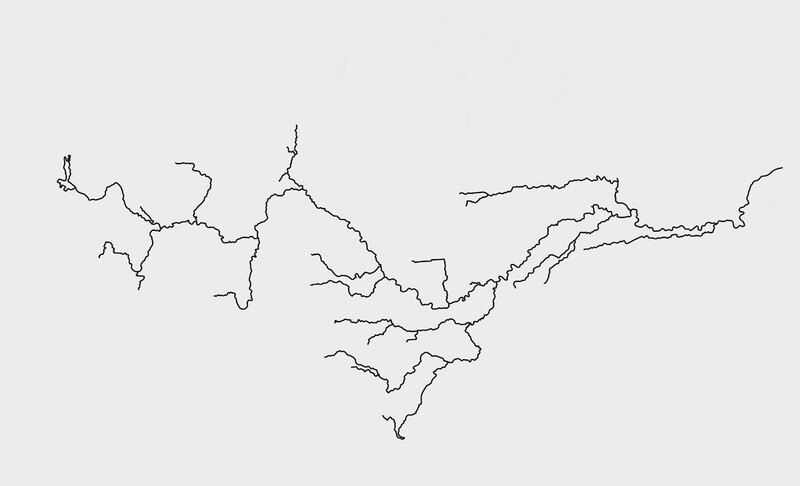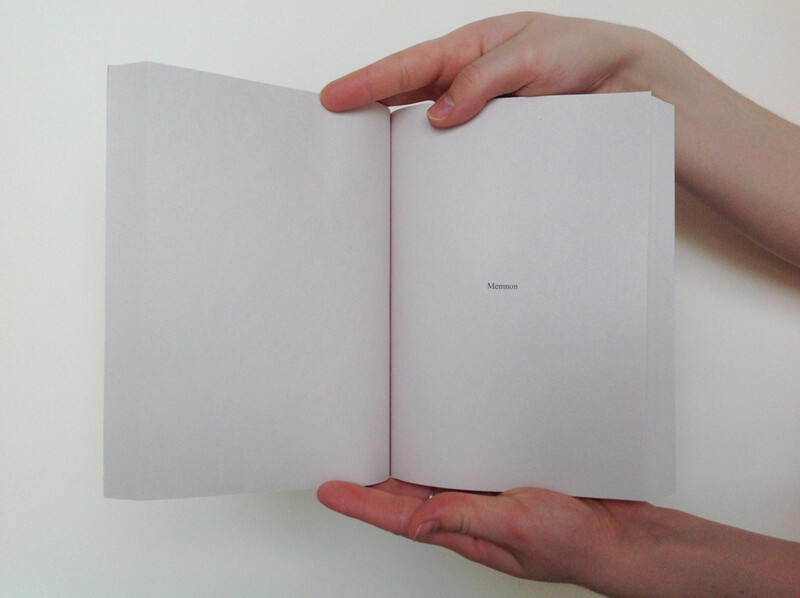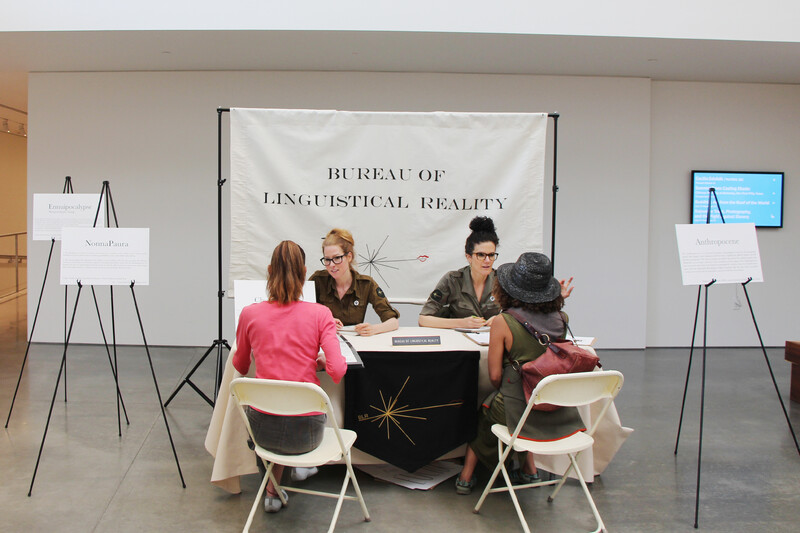Christina Battle is an artist based in amiskwacîwâskahikan, (also known as Edmonton, Alberta), within the Aspen Parkland: the transition zone where prairie and forest meet. Her practice focuses on thinking deeply about the concept of disaster: its complexity, and the intricacies that are entwined within it. Much of this work extends from her recent PhD dissertation (2020) which looked closer to community responses to disaster: the ways in which they take shape, and especially to how online models might help to frame and strengthen such response.
Dylan A.T. Miner is a Wiisaakodewinini (Métis) artist, activist, and scholar. He is Director of American Indian and Indigenous Studies and Associate Professor in the Residential College in the Arts and Humanities at Michigan State University. Miner sits on the Michigan Indian Education Council, is a founding member of the Justseeds Artists’ Cooperative, has been featured in over twenty solo exhibitions, and been an artist in residence or visiting artist at institutions across North America and Europe. He holds a PhD from The University of New Mexico and has published more than sixty journal articles, book chapters, critical essays, and encyclopedia entries, and numerous limited-edition artist books/booklets. He recently commenced the Bootaagaani-minis ∞ Drummond Island Land Reclamation Project and is uncertain if he will return to academic writing.
Lisa Myers is an independent curator and artist with a keen interest in interdisciplinary collaboration. Myers has an MFA in Criticism and Curatorial Practice from OCAD University. Since 2010, she has worked with anthocyanin pigment from blueberries in printmaking, and in her stop-motion animation. Her participatory performances involve sharing berries and other food items in social gatherings, reflecting on the value found in place and displacement; straining and absorbing. She has exhibited her work in solo and group exhibitions across Canada and her writing has been published in a number of exhibition publications in addition to Senses and Society, C Magazine and FUSE. She is an Assistant Lecturer in the Faculty of Environmental Studies at York University. Myers is a member of Beausoleil First Nation and she is based in Port Severn and Toronto.
Eduardo Navarro investigates different ways of transforming our senses in order to have a new understanding of our world. His works range from large-scale sculptures to actions and participatory installations that investigate empathy and contemplation. His work has recently been shown at the Universidad Torcuato Di Tella, Buenos Aires; Museo Rufino Tamayo, Mexico City; High Line Art, New York; Der Tank, Basel; and the Drawing Center, New York. His work has been featured in major international group exhibitions including Tidalectics, TBA21, the Mercosul Biennial; the Bienal de São Paulo; Surround Audience: The New Museum Triennial, New York; the Sharjah Biennial; La era metabolica at the Fundación Malba, Buenos Aires; and Metamorfosi at the Castello de Rivoli, Turin.
Julian Oliver is a New Zealander, critical engineer, and artist based in Berlin. His work has been presented at many museums, galleries, international electronic-art events and conferences, including the Tate Modern, Transmediale, the Chaos Computer Congress, Ars Electronica, FILE, and the Japan Media Arts Festival. Oliver has received several awards, including the distinguished Golden Nica at Prix Ars Electronica 2011 for the project Newstweek (with Daniil Vasiliev). He is the co-author of the Critical Engineering Manifesto and co-founder of Crypto Party in Berlin. He is also the co-founder of BLACKLIST, a screening and panel series focused on the primary existential threats of our time. He is an advocate of Free and Open Source Software and actively supports and contributes to initiatives that reinforce rights of privacy and anonymity in technologically-mediated domains.
Pejvak is the long-term collaboration between Rouzbeh Akhbari and Felix Kalmenson. Through their multivalent, intuitive approach to research and living, they find themselves in a convergence and entanglement with likeminded collaborators, histories, and various geographies.
Rouzbeh Akhbari is an artist working in video installation and film. His practice is research-driven and usually exists at the intersections of political economy, critical architecture, and planning. Through a delicate examination of the violences and intimacies that occur at the boundaries of lived experience and constructed histories, Akhbari uncovers the minutiae of power that organize and regiment the world around us.
Felix Kalmenson is an artist whose practice navigates installation, video, and performance. Kalmenson’s work variably narrates the liminal space of a researcher’s and artist’s encounter with landscape and archive. By bearing witness to everyday life, and hardening the more fragile vestiges of private and collective histories through their work, Kalmenson gives themselves away to the cadence of a poem, always in flux.
Ed Pien lives and works in Toronto. He has received a BFA from Western University and a MFA from York University. Pien has shown extensively in venues including the Drawing Centre, New York; the Victoria & Albert Museum; The Canadian Culture Centre, Paris; The Goethe Institute, Berlin; The Art Gallery of Ontario; Musée d’art contemporain Montréal; Art Gallery of Greater Victoria; The Mendel Art Gallery, Saskatoon; Musée des beaux-arts Montréal; Songzhuang Art Centre, Beijing; the National Art Gallery of Canada; and at MASS MoCA, Massachusetts. He has participated in the Montreal Biennale; the Sydney Biennale; the Moscow Biennale; the Beijing Biennale, as well as the Curitiba Biennial, Brazil.
Tomás Saraceno is an artist and initiator of The Aerocene Foundation.
Gediminas & Nomeda Urbonas are artists, MIT-based researchers and educators, and co-founders of Urbonas Studio, an interdisciplinary research practice that facilitates exchange amongst diverse nodes of knowledge production and artistic practice in pursuit of projects that transform civic spaces and collective imaginaries. They have exhibited internationally including at the São Paulo, Berlin, Moscow, Lyon, Venice, and Gwangju Biennales, Folkestone Triennial, and Manifesta and Documenta exhibitions (among others). They are the recipients of numerous grants and awards, including the Lithuanian National Prize (2007); a Prize for the Best International Artist at the Gwangju Biennale (2006) and the Prize for the national pavilion at the Venice Biennale (2007). They were also nominated for the Nam June Paik Award in 2012. Urbonas Studio curated Swamp School, a learning environment at the 16th Venice Architecture Biennale, 2018.
Paul Walde is an artist, composer, and curator. Walde’s body of work suggests unexpected interconnections between landscape, identity, and technology. Recent exhibitions of his work include: Au Loin Une Île at Mains d’OEuvres in Paris (2018), Records and Wireframes at Dundee Contemporary Arts as part of the NEoN Festival of Digital Media in Dundee, Scotland (2017) and The View from Up Here at the Anchorage Museum and the Nordnorsk Kunstmuseum in Tromsø, Norway (2016 and 2017). Walde is an Associate Professor and Chair of the Department of Visual Arts at the University of Victoria in Victoria, BC.
Tania Willard, of Secwépemc and settler heritage, works within the shifting ideas around contemporary and traditional, often working with bodies of knowledge and skills that are conceptually linked to her interest in intersections between Aboriginal and other cultures. Her curatorial work includes Beat Nation: Art Hip Hop and Aboriginal Culture (2012-2014), co-curated with Kathleen Ritter. In 2016 Willard received the Award for Curatorial Excellence in Contemporary Art from the Hnatyshyn Foundation and a City of Vancouver Book Award for the catalogue Unceded Territories: Lawrence Paul Yuxweluptun. Willard’s ongoing collaborative project, BUSH Gallery, is a conceptual land-based gallery grounded in Indigenous knowledges and relational art practices. Willard is an MFA candidate at UBCO Kelowna, and her current research constructs a land rights aesthetic through intuitive archival acts.
Jana Winderen is an artist educated in Fine Art at Goldsmiths, University of London, with a background in mathematics, chemistry, and fish ecology from the University of Oslo. Winderen focuses on audio environments and ecosystems which are hard for humans to access, both physically and aurally. Amongst her activities are immersive multi-channel sound installations and concerts which have been performed internationally in major institutions and public spaces in America, Europe, and Asia. Winderen lives and works in Oslo.
Xiaojing Yan is a Chinese-Canadian artist working and living in Markham, Ontario. She received a BFA from Nanjing University of the Arts in 2000 and an MFA from Indiana University of Pennsylvania in 2007. Her work has been shown internationally, including at the Royal Ontario Museum and the Suzhou Museum, China. Her work has been collected by many museums, institutions, and private collectors. She is also a recipient of numerous grants and awards, including the 2014 Outstanding Young Alumni Award from Indiana University of Pennsylvania, Project Grants from the Canada Council for the Arts, the Chalmers Arts Fellowship, and the Mid-Career Visual Artist Grant from the Ontario Arts Council.
Christine Shaw is Director/Curator of the Blackwood Gallery and Associate Professor of Curatorial Studies in the Department of Visual Studies at the University of Toronto Mississauga, a Research Fellow & Visiting Scholar in Art, Culture Technology (ACT) at the Massachusetts Institute of Technology, and Curatorial Research Fellow, Andy Warhol Foundation for the Visual Arts (2021–2023).
Shaw’s work convenes, enables, and amplifies the transdisciplinary thinking necessary for understanding our current multi-scalar historical moment and co-creating the literacies, skills, and sensibilities required to adapt to the various socio-technical transformations of our contemporary society. She has applied her commitment to compositional strategies, epistemic disobedience, and social ecologies to multi-year curatorial projects including Take Care (2016–2019), an exhibition-led inquiry into care, exploring its heterogeneous and contested meanings, practices, and sites, as well as the political, economic, and technological forces currently shaping care; The Work of Wind: Air, Land, Sea (2015–2023), a variegated series of curatorial and editorial instantiations of the Beaufort Scale of Wind Force exploring the relentless legacies of colonialism and capital excess that undergird contemporary politics of sustainability and climate justice; and OPERA-19: An Assembly Sustaining Dreams of the Otherwise (2021–2029), a decentralized polyvocal drama in four acts taking up asymmetrical planetary crisis, differential citizenship, affective planetary attention disorder, and a strategic composition of worlds. She is the founding editor of The Society for the Diffusion of Useful Knowledge (Blackwood, 2018–ongoing), and co-editor of The Work of Wind: Land (Berlin: K. Verlag, 2018) and The Work of Wind: Sea (Berlin: K. Verlag, 2023).
The Aerocene Foundation—initiated by artist Tomás Saraceno—is a non-profit organization devoted to community building, scientific research, artistic experience, and education.
Gabriel Allahdua is from St Lucia and is a member of Justice for Migrant Workers. He works on farms in Ontario and speaks up for better working conditions.
d’bi.young anitafrika is an African-Jamaican-Tkarontonian, London-based dub poet, theatre interventionist and decolonial scholar committed to embodying art that ritualizes acts of transformation from violence inflicted upon the people and the planet. The multi-award-winning Canadian Poet of Honour, author of twelve plays, seven albums, and four collections of poetry was recently recognized as a Global Leader in Theatre and Performance by Arts Council England. After receiving hxr Masters from the University of London, anitafrika was awarded a Dean's Scholarship by London South Bank University (LSBU) to conduct doctoral research in Black womxn’s theatre. In addition to being the Director of Curriculum Design and Pedagogy at the new Soulpepper Theatre Academy in Canada, anitafrika works at the UN's Global Initiatives Fellowship as Theatre Interventionist and lectures at LSBU. Shx continues to share hxr liberatory framework—the Anitafrika Method—with practitioners worldwide through hxr ongoing online residencies. Shx most recently worked as Director of Kaie Kellough’s Jah in the Ever-Expanding Song for Obsidian Theatre’s 21 Black Futures project and is currently completing Dubbin Theatre, an anthology of hxr plays written between 2000-2020. You can find hxr latest theatrical work in She Mama Wata— as an audio version that she wrote, directed and performed—featured in Soulpepper Theatre’s Around the World in 80 Plays.
Beverly Bain is a Black queer feminist scholar who teaches in Women and Gender Studies at the University of Toronto Mississauga. She teaches and researches in the area of Black and Caribbean diasporic sexualities, violence against women and the Black queer radical feminist tradition in Canada.
Alana Bartol comes from a long line of water witches. Her site-responsive works explore walking and divination as ways of understanding across places, species, and bodies. Bartol’s work has been presented across Canada at Walter Phillips Gallery (Banff), InterAccess (Toronto), Plug In Institute for Contemporary Art (Winnipeg), Access Gallery (Vancouver), and Art Gallery of Windsor, as well as in Romania, Germany, Mexico, and the United States. Recent and upcoming residencies include Santa Fe Art Institute (USA), Eastern Edge Gallery (St. John’s), and Canadian Armed Forces Artist Program. Bartol currently lives in Calgary where she teaches at the Alberta College of Art and Design.
Sheila Batacharya teaches and writes. She grew up on Royal Windsor Drive, two kilometres from the Pittsburgh Plate Glass of Canada factory in Clarkson where her father worked as a chemical engineer from the late 1960s until he retired in the 1990s. Batacharya’s work about embodiment is shaped by paying attention to race and colonization, and by examining perception as inextricably socially constructed but more than just discursive.
Amanda Boetzkes is Professor of Contemporary Art History and Theory at the University of Guelph. Her research specializes in ecology, theories of consciousness and perception. Over the course of her career, she has analyzed complex human relationships with the environment through the lens of aesthetics, patterns of human waste, and the global energy economy. She is the author of Plastic Capitalism: Contemporary Art and the Drive to Waste (MIT Press, 2019), The Ethics of Earth Art (University of Minnesota Press, 2010) and a forthcoming book titled Ecologicity, Vision and the Planetarity of Art. She is co-editor of Art's Realism in the Post-Truth Era (Edinburgh University Press, 2024), Artworks for Jellyfish and Other Others (Noxious Sector Press, 2022) and Heidegger and the Work of Art History (Ashgate, 2014). In her most recent research, Boetzkes focuses on environmental knowledge and aesthetics in the circumpolar North, the politics of Inuit sovereignty, and the Greenland Ice Sheet as a site of scientific, social, and perceptual importance. In 2019, she held an interdisciplinary, site-specific workshop in Ilulissat, Greenland, and curated a performance by the Greenlandic artist Jessie Kleemann on the Ice Sheet. This performance has since shown at numerous exhibitions and galleries including Inua at the inaugural exhibition of the Inuit Art Center in Winnipeg (2021); Exposure: Native Art and Political Ecology at the Museum of Contemporary Native Art in Santa Fe (2021); Worst Case Scenario: Four Artists from Greenland - Pia Arke, Julie Edel Hardenberg, Elisabeth Heilmann Blind, Jessie Kleemann at the Lunds Konsthalle in Sweden (2021); Jessie Kleemann at the Portland Museum of Art (2022); Jessie Kleemann: Running Time* at the Danish National Gallery (2023); and the Nordic pavilion of COP28 in Dubai (2023).
D.T. Cochrane is an economist currently living in Peterborough, Canada with his partner and two children. He is an economic research consultant with the Blackwood Gallery at the University of Toronto Mississauga and the Indigenous Network on Economies and Trade. He is a postdoctoral fellow in "Innovation and Rentiership" at York University with Dr. Kean Birch. He is also a researcher with Canadians for Tax Fairness, where he works on issues of corporate power and inequality. D.T.’s central interest is the translation of qualities into quantities, and the ways that process and its outputs participate in the many struggles to remake our worlds.
Vanessa Gray is an Anishinaabe kwe from Aamjiwnaang First Nation, located in Canada’s Chemical Valley. As an organizer with Aamjiwnaang and Sarnia Against Pipelines (ASAP), she works with community members to bring awareness to the health issues resulting from her reserve’s toxic surroundings. On December 21, 2015, Vanessa was arrested for shutting down Enbridge’s Line 9 pipeline.
Sonja Greckol is grateful for subways and bike lanes wherever. She published three poetry books No Line In Time (2018) Skein of Days (2014) and Gravity Matters (2008). Her long poem “No Line In Time” won the 2017 Briarpatch Writing In the Margins Poetry Contest. She edits poetry for Women and Environments International. The re-election of Mike Harris propelled her into poetry; the election of Doug Ford propels her deeper into local activism with an eye to both the stars and the earth.
Evelyn Encalada Grez is a transnational community organizer and co-founder of the award-winning collective, Justice for Migrant Workers. She has been organizing with migrant farmworkers for nearly two decades throughout rural Canada and in their home communities in Mexico and Guatemala. She has a PhD in Social Justice Education from Ontario Institute for Studies in Education at the University of Toronto and her doctoral work focuses on the transnational lives of Mexican migrant women working and forging a living in rural Canada.
Myra J. Hird directs Canada’s Waste Flow (CWF), an interdisciplinary research program connecting people interested in the topic of waste to consider Canada’s waste future. Researchers at CWF study the movement, processing, treatment, and after-effects of diverse waste streams, including by-products of mining, nuclear energy, biomedicine, and domestic waste linked to larger issues such as overconsumption, settler colonialism, intra- and extra-governmental relations, and public dialogue. Hird is a Professor in the School of Environmental Studies.
Renée Hložek is Assistant Professor at the Dunlap Institute of Astrophysics, University of Toronto. Hložek studied at the University of Pretoria and the University of Cape Town. She received her PhD from the University of Oxford in 2011, where she was a Rhodes Scholar. Before coming to the Dunlap, she was a Lyman Spitzer Jr. Postdoctoral Research Fellow in the Department of Astrophysics at Princeton University and the Spitzer-Cotsen Fellow in the Princeton Society of Fellows. She is also a Senior TED Fellow.
Julie Joosten is a poet, essayist, and editor who lives and works in Tkaronto. Her first book of poetry, Light Light (Book Thug, 2013), was short-listed for the Governor General’s Award. Her next book, For Nor, is forthcoming from Book Thug in the spring of 2019. It explores perceptual styles, affect, form, and politics.
Tom Keefer is a media creator and consultant in the field of First Nations economic development and governance.
Erica Violet Lee is a two-spirit nēhiyaw writer and community organizer from westside Saskatoon, Saskatchewan. She has a BA in political theory from the University of Saskatchewan, and is now a graduate student at the Ontario Institute for Studies in Education, University of Toronto, pursuing her master’s degree in the department of Social Justice Education with a focus on Indigenous feminist freedom and embodied sovereignties.
Jamie Magnusson has been doing breath work as community building for a number of years. She has worked with queer/trans communities, sex workers, and BIPOC women who have experienced intimate partner violent and police violence. She is interested in breath-body consciousness in terms of “the social body,” and breath work as deeply connected to issues of sovereignty, and cultures that we consciously and collectively build.
Dolleen Tisawii’ashii Manning is a member of Kettle and Stoney Point First Nation, and a recipient of the SSHRC Postdoctoral Fellowship held at Michigan State University, September 2018-2020. Manning is an Anishinaabe artist and scholar with graduate degrees in critical theory and contemporary art. She works at the intersection of Indigenous philosophy, epistemology and ontology, critical theory, phenomenology, and art.
Dylan A.T. Miner is a Wiisaakodewinini (Métis) artist, activist, and scholar. He is Director of American Indian and Indigenous Studies and Associate Professor in the Residential College in the Arts and Humanities at Michigan State University. Miner sits on the Michigan Indian Education Council, is a founding member of the Justseeds Artists’ Cooperative, has been featured in over twenty solo exhibitions, and been an artist in residence or visiting artist at institutions across North America and Europe. He holds a PhD from The University of New Mexico and has published more than sixty journal articles, book chapters, critical essays, and encyclopedia entries, and numerous limited-edition artist books/booklets. He recently commenced the Bootaagaani-minis ∞ Drummond Island Land Reclamation Project and is uncertain if he will return to academic writing.
SHATTERED MOON ALLIANCE is a living research project taking the form of a series of participatory workshops exploring science fiction narrative worldbuilding. SHATTERED MOON ALLIANCE is Christina Battle and Serena Lee.
Originally from Edmonton, Christina Battle is currently based in London (ON). Her research and work consider the parameters of disaster; looking to it as action, as more than mere event, and instead as a framework operating within larger systems of power.
Serena Lee’s practice stems from a fascination with polyphony and its radical potential. Based in Toronto, Lee practices and collaborates close to home and internationally. Recent projects have been presented at Whitechapel Gallery (London), The Research Pavilion at the 57th Venice Biennale, the Images Festival, Forest City Gallery (London, ON), Toronto Reel Asian Film Festival, The Theatre Centre/FADO Performance Art Centre (Toronto), and Mountain Standard Time (Calgary).
Kent Moore is a Professor of Physics and Vice-Principal of Research at the University of Toronto Mississauga. Moore has a PhD in Geophysical Fluid Dynamics from Princeton University, and his research interests include geophysical fluid dynamics, mesoscale meteorology, and polar meteorology. He has published over 160 peer-reviewed research papers and has played a leadership role in a number of national and international research collaborations focused on improving our understanding of the interactions that occur with the climate system. Professor Moore has also trained over forty undergraduate students, graduate students, and post-doctoral fellows who have gone onto varied careers in the financial services industry, government, and academia.
Stephen Morris is the J. Tuzo Wilson Professor of Geophysics, Department of Physics, at the University of Toronto, where he leads the Experimental Nonlinear Physics Research Group. His research involves experiments on emergent patterns in fluids, granular media, ice formations, and fracture. He is also interested in natural patterns, and in the history of physics.
Michelle Murphy works on decolonial feminist technoscience studies. She is the author of three books, the most recent being The Economization of Life (Duke University Press, 2017). She is director of the Technoscience Research Unit, which hosts a social justice technoscience lab with a specific focus on environmental and data justice. Murphy is a Professor of History and Women and Gender Studies at the University of Toronto. She is Métis from Winnipeg.
Lisa Myers is an independent curator and artist with a keen interest in interdisciplinary collaboration. Myers has an MFA in Criticism and Curatorial Practice from OCAD University. Since 2010, she has worked with anthocyanin pigment from blueberries in printmaking, and in her stop-motion animation. Her participatory performances involve sharing berries and other food items in social gatherings, reflecting on the value found in place and displacement; straining and absorbing. She has exhibited her work in solo and group exhibitions across Canada and her writing has been published in a number of exhibition publications in addition to Senses and Society, C Magazine and FUSE. She is an Assistant Lecturer in the Faculty of Environmental Studies at York University. Myers is a member of Beausoleil First Nation and she is based in Port Severn and Toronto.
Julian Oliver is a New Zealander, critical engineer, and artist based in Berlin. His work has been presented at many museums, galleries, international electronic-art events and conferences, including the Tate Modern, Transmediale, the Chaos Computer Congress, Ars Electronica, FILE, and the Japan Media Arts Festival. Oliver has received several awards, including the distinguished Golden Nica at Prix Ars Electronica 2011 for the project Newstweek (with Daniil Vasiliev). He is the co-author of the Critical Engineering Manifesto and co-founder of Crypto Party in Berlin. He is also the co-founder of BLACKLIST, a screening and panel series focused on the primary existential threats of our time. He is an advocate of Free and Open Source Software and actively supports and contributes to initiatives that reinforce rights of privacy and anonymity in technologically-mediated domains.
Pejvak is the long-term collaboration between Rouzbeh Akhbari and Felix Kalmenson. Through their multivalent, intuitive approach to research and living, they find themselves in a convergence and entanglement with likeminded collaborators, histories, and various geographies.
Rouzbeh Akhbari is an artist working in video installation and film. His practice is research-driven and usually exists at the intersections of political economy, critical architecture, and planning. Through a delicate examination of the violences and intimacies that occur at the boundaries of lived experience and constructed histories, Akhbari uncovers the minutiae of power that organize and regiment the world around us.
Felix Kalmenson is an artist whose practice navigates installation, video, and performance. Kalmenson’s work variably narrates the liminal space of a researcher’s and artist’s encounter with landscape and archive. By bearing witness to everyday life, and hardening the more fragile vestiges of private and collective histories through their work, Kalmenson gives themselves away to the cadence of a poem, always in flux.
Karyn Recollet is an Assistant Professor in the Women and Gender Studies Institute at the University of Toronto. Recollet is an urban Cree whose research explores the multiple layered relationships that urban Indigenous folx have with lands’ overflow. Her focal points are choreographic fugitivity, Indigenous futurities, decolonial love/processes of creating radical relationalities with kin.
ŠA Atelier is an art and architecture studio established in Vilnius by Gabrielė and Antanas Šarkauskai. Each completed a Bachelor in Architecture at the Vilnius Academy of Arts and master's degrees at the Vilnius Gediminas Technical University: Gabrielė, a Master in Theory and History of Architecture, and Antanas, a Master in Architecture. They design and lead architecture-related workshops for children and adults, aiming to combine practical functional achievement and exploration of theoretical issues.
Anna-Sophie Springer is a curator, writer, editor, and director of the publishing imprint K. Verlag in Berlin. She is the co-editor, with Etienne Turpin, of the intercalations: paginated exhibition series.
Synthetic Collective is an interdisciplinary collaboration between visual artists, cultural workers, and scientists working together to sample, map, understand, and visualize the complexities of plastics and micro-plastics pollution in the Great Lakes Region. Their enquiry is at the intersections of geologic processes, plastics pollution, and artistic production. The collective is working to expand its network of resources and researchers with the goal of developing a more tangible understanding of plastics pollution as a wicked problem: one that is both a local and global systemic issue, yet also a potential site for innovation and remediation. Synthetic Collective includes Sara L. Belontz, Patricia L. Corcoran, Heather Davis, Kathleen A. Hill, Kelly Jazvac, Kirsty Robertson, and Kelly Wood.
Adrienne Telford is a white settler lawyer based in Toronto, Canada. She practices with the law firm Cavalluzzo LLP in the areas of Aboriginal, constitutional, labour, and human rights law, and is legal counsel to Asubpeeschoseewagong Netum Anishinabek (Grassy Narrows First Nation).
Etienne Turpin is a philosopher, founding director of anexact office, and research coordinator of User Group Inc. LLP, worker-owned cooperative building software for disaster response and environmental monitoring. With Anna-Sophie Springer, he is co-principal investigator of Reassembling the Natural.
Tania Willard, of Secwépemc and settler heritage, works within the shifting ideas around contemporary and traditional, often working with bodies of knowledge and skills that are conceptually linked to her interest in intersections between Aboriginal and other cultures. Her curatorial work includes Beat Nation: Art Hip Hop and Aboriginal Culture (2012-2014), co-curated with Kathleen Ritter. In 2016 Willard received the Award for Curatorial Excellence in Contemporary Art from the Hnatyshyn Foundation and a City of Vancouver Book Award for the catalogue Unceded Territories: Lawrence Paul Yuxweluptun. Willard’s ongoing collaborative project, BUSH Gallery, is a conceptual land-based gallery grounded in Indigenous knowledges and relational art practices. Willard is an MFA candidate at UBCO Kelowna, and her current research constructs a land rights aesthetic through intuitive archival acts.
The Bureau of Linguistical Reality was established in 2014 by two artists who were at a total loss for words to describe the emotions and experiences they were having around climate change and other Anthropogenic events.
Alicia Escott is an interdisciplinary artist whose work addresses issues of species-loss, the process of commercial mediation in late-capitalist society, and individual experiences of loss, heartbreak, and longing in the Anthropocene. Her work connects the speed of change today with the speed of change in the geologic history of the planet.
Heidi Quante is an artist and founder of the non-profit Creative Catalysts, an organization that brings together experts from diverse disciplines to devise innovative ways to raise awareness, inspire dialogue, and spark action on pressing social and environmental issues.
Gillian Dykeman is a multi-disciplinary artist based in Fredericton, New Brunswick. Working through an intersectional feminist and postcolonial framework, Dykeman seeks to empower her audiences in their own lives through playful and critical engagement with visual culture. Her work spans mediums and disciplines such as performance, video, sound, installation, and art criticism. She has a Masters in Visual Culture from the University of Toronto, and a Bachelor of Fine Arts from NSCAD. Dykeman is an instructor in Foundation Visual Arts and Advanced Studio Practice at the New Brunswick College of Craft and Design. Her work has been exhibited and screened in galleries, exercise studios, a rare book library, and a geodesic dome.
Julien Gordon is the Ecosystem Goods and Services Technician for Credit Valley Conservation (CVC). CVC is a community-based environmental organization, dedicated to protecting, restoring and managing the natural resources of the Credit River Watershed.
Steve G. Hoffman is an Assistant Professor of Sociology at the University of Toronto Mississauga, where he teaches classes on classical sociological theory, the sociology of disaster, power and cultural politics, and science and technology studies. Hoffman’s research focuses on the cultural politics of knowledge production, with a particular interest in the “ontic work” that goes into the production and popular use of simulation techniques and technologies. Although born and raised in Southern California, after spending most of his adult life in Chicago, Buffalo, and now Toronto, he sees the Great Lakes Region of North America as home turf.
Zoe Hopkins was born in Bella Bella, a small and remote fishing village on the coast of BC, in the heart of the Great Bear Rainforest. She is Heiltsuk and Mohawk and is a fluent Mohawk language speaker. She is a mother and passionate about family. The themes of home, family, and language run through her body of work. Impossible to Contain is released by CBC’s Short Docs program.
Jumana Manna is an artist working primarily with film and sculpture. Her work explores how power is articulated through relationships, often focusing on body and materiality in relation to narratives of state building and histories of place.
Andrea Muehlebach is Associate Professor of Anthropology at the Department of Anthropology at the University of Toronto Mississauga. An economic and political anthropologist, she explores the ethics and politics of economic life—as notably on questions such as welfare, citizenship, and morality and, more recently, on the political, economic, and ethical implications of water privatization and financialization. She is the author of The Moral Neoliberal (University of Chicago Press, 2012). Her book-in-progress, A Vital Politics: Water Insurgencies in Europe, is a study of different water movements in Europe and the question of how water—as commons or “resource”—should be governed and valued now and in the future.
Joshua D. Pilzer is Associate Professor of Ethnomusicology in the Faculty of Music, University of Toronto, and an affiliate faculty of the Centre for the Study of Korea. His research focuses on the anthropology of music in modern Korea and Japan, women’s musical worlds, and the relationships between music, survival, memory, traumatic experience, marginalization, disability, public culture, mass media, social practice, and identity. He is particularly interested in everyday musical practice as a life resource, and in the “musical” features of so-called extra-musical practices like speech and everyday movement. He is the author of Hearts of Pine: Songs in the Lives of Three Korean Survivors of the Japanese ‘Comfort Women’ (Oxford, 2012) and since 2011 has been conducting fieldwork for his next book project, an ethnography of music and song among Korean victims of the atomic bombing of Japan and their children. That book is tentatively titled The Art of Making Life Work in “Korea’s Hiroshima.”
Andrea Pinheiro is an artist and curator working in photography, print, paint, film, and installation. She has exhibited across Canada and internationally, at Presentation House (Polygon) Gallery, the Art Gallery of Ontario, the Art Gallery of Vancouver, the Art Gallery of Alberta, the Novosibirsk Graphic Triennial, The Kyoto Museum of Art, and Or Gallery, Berlin. She has completed residencies at the Banff Centre for the Arts, AB; Montello Foundation, Nevada; and SIM Reykjavik, Iceland; as well as a curatorial residency at Unitt Pitt in Vancouver, BC. Her work is represented by Cooper Cole Gallery in Toronto and Republic Gallery in Vancouver. She is an Associate Professor at Algoma University in Sault Ste. Marie, ON, and is the director of 180 Projects, an experimental exhibition space.
Justin Podur is an Associate Professor at the Faculty of Environmental Studies at York University. In addition to his scientific publications, he is the author of Haiti’s New Dictatorship and the upcoming novel Siegebreakers.
Sean Procyk is a settler artist and playground designer. His practice focuses on creating immersive public engagements through site-specific installation, architecture, and community workshops. Each project responds to its regional context, with a particular focus on unsettling relationships between landscape, community, and ecology. Procyk’s work explores processes of ecological succession, land-based disturbance, human alienation, and collective action. He works primarily with found, reclaimed, and natural materials. Procyk’s works have been exhibited at Hamilton Artists Inc., Latitude 53, Stride Contemporary Art Gallery, Elemental Festival, Convergence Conference on Art and Technology in Banff, and Nuit Blanche Toronto.
Sara Saljoughi is Assistant Professor of English and Cinema Studies at the University of Toronto. Her areas of research include international cinemas, film theory, postcolonial theory, and migration and diaspora studies. She is co-editor of the book 1968 and Global Cinema. Currently she is writing a book on the aesthetics and politics of cinema in Iran during the 1960s and 1970s.
Polina Teif (1989) is a Belarus-born artist and filmmaker based in Toronto. She received her BFA from the University of Toronto with emphasis on Visual Studies and Semiotics and completed an MFA in Documentary Film Production at York University. In 2019 she attended the Doc Institute Breakthrough Program and was awarded the Hot Docs Pitch prize and the 2019 Planet in Focus Green Pitch Award. In 2019, she participated in the Cannes Doc Corner Canadian Showcase, and in 2020 she attended the Berlinale EMF DocSalon Toolbox Program and the 2020 Hot Docs Accelerator Program. Her work has been shown at the Istanbul Design Biennial, Trinity Square Video, Gallery Stratford, Art Metropole, Hart House, Nuit Blanche, and Idea Exchange; and published in DER GRIEF, Aesthetica Magazine, Hart House Review, Magenta, Collective Terrain, LUMA Quarterly, and ICON Magazine.
Rav Singh is the Urban Agriculture Coordinator for Ecosource, an innovative Ontario-based organization that empowers the community to become more environmentally responsible through creative public education. Singh is interested in exploring the relationship between food and aspects of urban society, including urban food security, food justice, and sustainable urban planning.
Amanda White (she/her) is a white settler artist/scholar living and working on the traditional territories of the Mississaugas of the Credit, Anishinaabe, Huron-Wendat, and Haudenosaunee peoples. Amanda is a SSHRC Postdoctoral Fellow at the Centre for Sustainable Curating, Department of Visual Art at Western University. She has a PhD (Queen’s) and an MFA (Windsor). Amanda works across mediums with a focus on plants, food, and environmental justice, with recent exhibitions and projects for: McIntosh Gallery, Museum London, Cambridge Galleries, Koffler Digital and PUBLIC Journal. Current collaborative and solo projects include studio work, a co-edited book, and a graphic novel.
Joy Xiang is a writer, arts worker, and perpetual late bloomer living in Tkaronto. Her work engages desire, migration, material flows, and media nostalgia and futurity. She prioritizes collective and collaborative processes, and learning ways of being together in complication and intimacy. Her first zine cold blood used cold-blooded creatures as a metaphor for creative and survival-focused adaptation strategies. She has been on the editorial team of Milkweed, re:asian, and Canadian Art; written for Mercer Union, Ada X, and Hamilton Artists Inc.; and held positions at Blackwood Gallery and Vtape. She is a member of the feminist working group EMILIA-AMALIA.

